
* A Distributed Proofreaders Canada eBook *
This eBook is made available at no cost and with very few restrictions. These restrictions apply only if (1) you make a change in the eBook (other than alteration for different display devices), or (2) you are making commercial use of the eBook. If either of these conditions applies, please contact a https://www.fadedpage.com administrator before proceeding. Thousands more FREE eBooks are available at https://www.fadedpage.com.
This work is in the Canadian public domain, but may be under copyright in some countries. If you live outside Canada, check your country's copyright laws. IF THE BOOK IS UNDER COPYRIGHT IN YOUR COUNTRY, DO NOT DOWNLOAD OR REDISTRIBUTE THIS FILE.
Title: The Haliburton First Reader
Date of first publication: 1912
Author: Margaret Winifred Haliburton (1855 - 1928)
Date first posted: Apr. 1, 2021
Date last updated: Oct. 21, 2023
Faded Page eBook #20210402
This eBook was produced by: Marcia Brooks, Howard Ross & the online Distributed Proofreaders Canada team at https://www.pgdpcanada.net
This file was produced from images generously made available by Internet Archive/American Libraries.

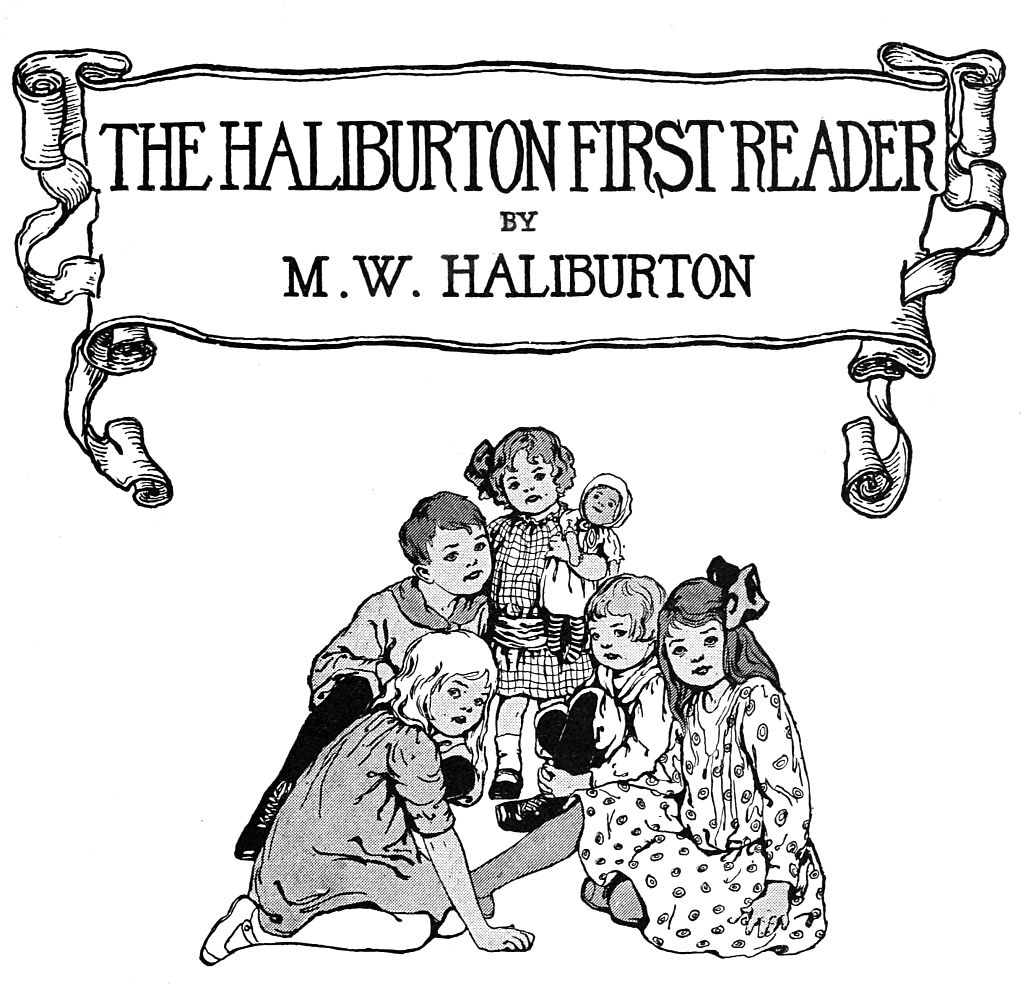
D. C. HEATH & COMPANY
BOSTON NEW YORK CHICAGO
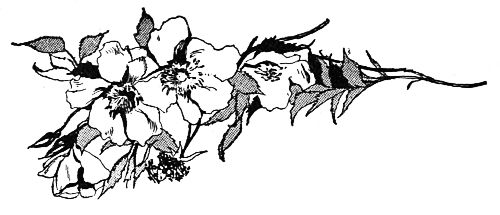
| With the Children and the Birds | Pages 1-13 |
| In Summer Time | 14-39 |
| Fun for Rainy Days | 40-63 |
| At Sunset | 64-70 |
| In the Fall Woods | 71-87 |
| Winter Days and Nights | 88-115 |
| The Year’s at the Spring | 116-133 |
| Vocabulary | 134-137 |
| ———— | |
| Suggestions to Teachers | 138-140 |
| Words for Phonic Drill | 140-142 |
In the story groups will be found brief selections from Thomas Bailey Aldrich, Mary Mapes Dodge, Robert Loveman, George Macdonald, Christina Rossetti, Sir Walter Scott, Robert Louis Stevenson and Celia Thaxter.
For kind permission to use “Farewell to the Farm” the author and publishers are indebted to Messrs. Charles Scribner’s Sons; and for “It is not Raining Rain to Me” to Mr. Robert Loveman. The copyrighted poems “Spring” by Celia Thaxter, and “Pleasanter than All” by Thomas Bailey Aldrich, are reprinted by permission of the Houghton Mifflin Co.
COPYRIGHT, D. C. HEATH & COMPANY, 1912
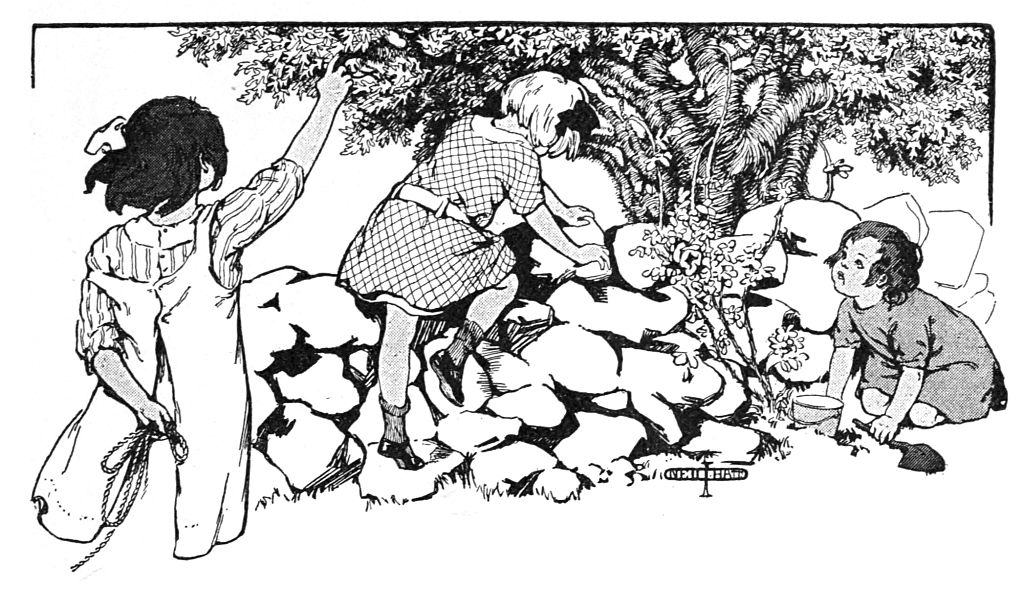
Here are Grace and Alice.
Their little sister is with them.
Do you know their little sister’s name?
Her name is Betty.
Betty says she is not a baby now.
The little girls came here to play.
| came | game | same | frame |
| name | dame | tame | shame |
Grace was jumping a rope by the wall.
She saw a bird’s nest in the oak tree.
Alice said, “I will get up on the wall, Grace.
Then I can see what is in the nest.
The nest is like a little swing.
I hope some dear baby birds are in it.
I hope I can see the dear little birds.
I see the mother bird in the tree.
I hope she will sing to us about the bird swing.
Sing, mother bird, sing!
Sing a little song to me.”
| hope | pope | cope | lope |
| rope | mope | tope | slope |
Little birdie in the tree,
In the tree, in the tree,
Little birdie in the tree,
Sing a song for me.
Sing about the red, red rose
On the wall, on the wall.
Sing about the bird swing
In the tree-top tall.
Little birdie in the tree,
In the tree, in the tree,
Little birdie in the tree,
Sing a song for me.
| rose | nose | close | chose |
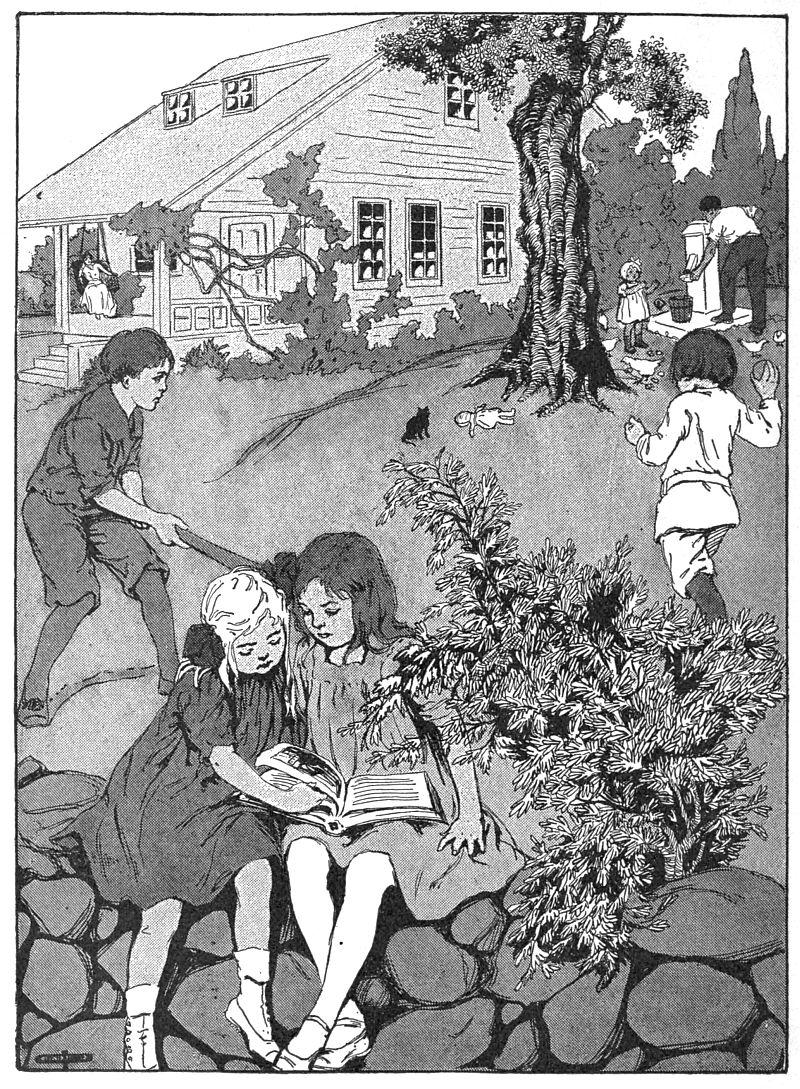
Here is the children’s home.
The children are happy in the old home.
Here are Father and Mother.
What are they doing?
Do you see Frank and Max?
Which boy has the ball?
Which boy has the bat?
Do you see Betty’s doll and the kitty?
The kitty’s name is Mink.
Do you see the hen and chicks?
The hen’s name is Cluck-cluck.
What are Alice and Grace doing?
Alice and Grace go to school.
Betty does not go to school.
Betty is three years old.
| which | rich | much | such |
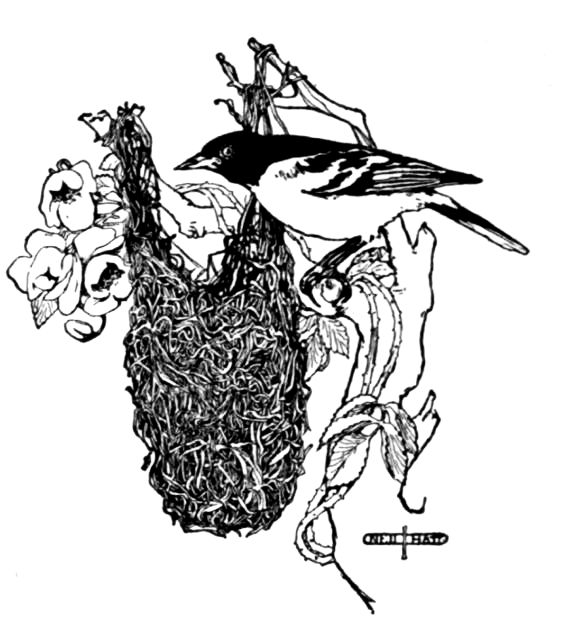
The old oak is tall.
The bird’s nest is on the big bough.
The big bough is high up on the old oak.
Alice said, “The nest is just like a swing.
It is up so high I cannot see into it.
The birds are happy in their swing.
The wind will say, ‘Rock-a-by, rock-a-by,’ to the birdies in the tree-top.
I hope the dear little birdies are safe.
We must watch the baby birds.
The wind may make them come tumbling down to the ground.”
| must | dust | rust | trust |
| just | gust | crust | thrust |
There’s a dear little nest
In the old oak tree,
Safe and high, safe and high.
There are three little eggs
Blue as blue can be,
Like the sky, like the sky.
There are three baby birds
In that little nest,
Up so high, up so high.
And the wind rocks the bough
Where they safely rest,
Rock-a-by, rock-a-by!
| nest | west | best | lest |
| rest | zest | chest | blest |
We were two happy little birds.
One day we flew to a tall oak tree.
A rose vine runs high up on the tree.
We liked the tall oak and the pretty rose vine.
We made a nest in the tall tree.
It hung in the pretty rose vine.
By and by there were three baby birds in the nest.
Then sweet songs were sung where the nest hung.
They were sung to the baby birds.
One day we flew away to find something for the birdies to eat.
We came back to the tall tree.
There hung the nest. But the birdies were gone.
| 1. | To a green tree | |
| A briar rose clung. | clung | |
| In that green tree | ||
| Our nest we hung. | hung | |
| 2. | By breezes free | |
| Our nest was swung. | swung | |
| To birdies three | ||
| Sweet songs were sung. | sung | |
| 3. | When the green trees | |
| Their shadows flung, | flung | |
| On the soft breeze | ||
| Glad notes had rung. | rung |

M. S. WILLIS.
4. Sad now search we.... The leaves a-mong.
From the green tree... Gone are the young.
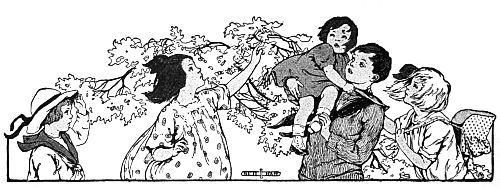
Frank, did you and Max see the nest in the rose vine?
Yes. It is such a fine home for birdies.
But the baby birds are gone, Frank.
The father and mother birds are looking for them.
I hope they will find their baby birds.
Max found a lark’s nest on the ground.
It is such a cunning nest, Alice.
I hope the baby larks are not gone.
| vine | mine | dine | thine |
| fine | nine | pine | shine |
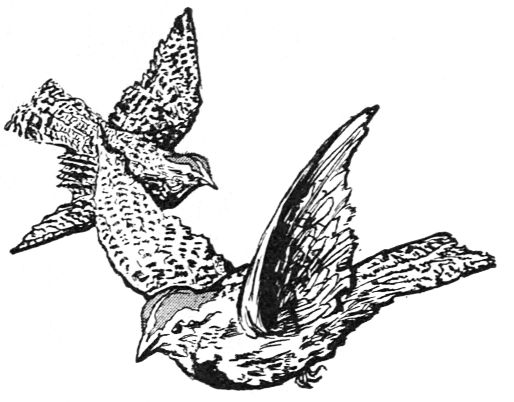
Up, up in the sky
The meadow larks fly
Up in the air so high.
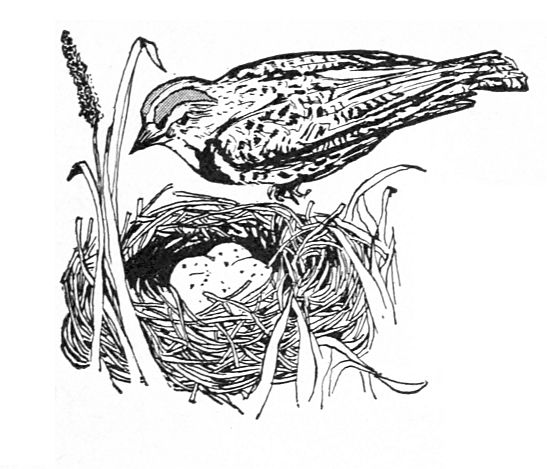
Down, down on the ground
Is a meadow lark found,
Down in a nest so round.
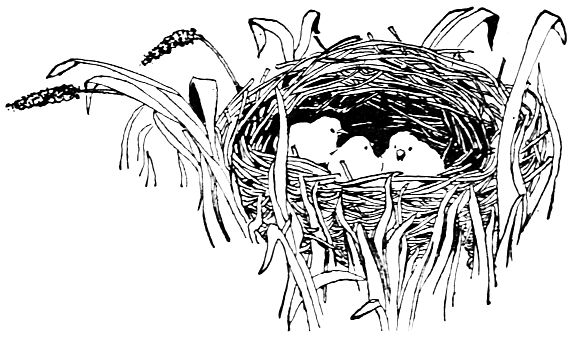
As they go to sleep
The birdies say, “Peep!”
Down in the grass so deep.
| round | sound | around |
| ground | hound | aground |
| wound | bound | abound |
| found | pound | abounds |
It is the spring time. The sky is blue.
The birds fly through the sweet air.
They sing in the tree tops.
The bees hum through the orchard.
The lambs run and jump in the clover.
The children sing and play with the lambs.
Betty and Alice have pet lambs.
Do you see the flowers on Alice’s lamb?
Alice likes to put flowers on the lamb’s neck.
She says, “See the flowers I have, Grace.
Let us put them on my lamb’s neck.
Come here, Betty, we will put some flowers on your pet’s neck.”
| neck | peck | beck | fleck |
| deck | speck | check | wreck |
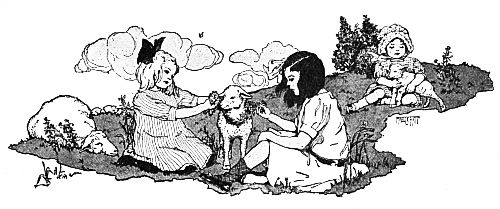
The little birds fly over,
And oh, how sweet they sing!
To tell the happy children
That once again ’tis spring.
Here blooms the sweet red clover.
There peeps the violet blue.
Oh, happy little children,
God made them all for you.
—Celia Thaxter
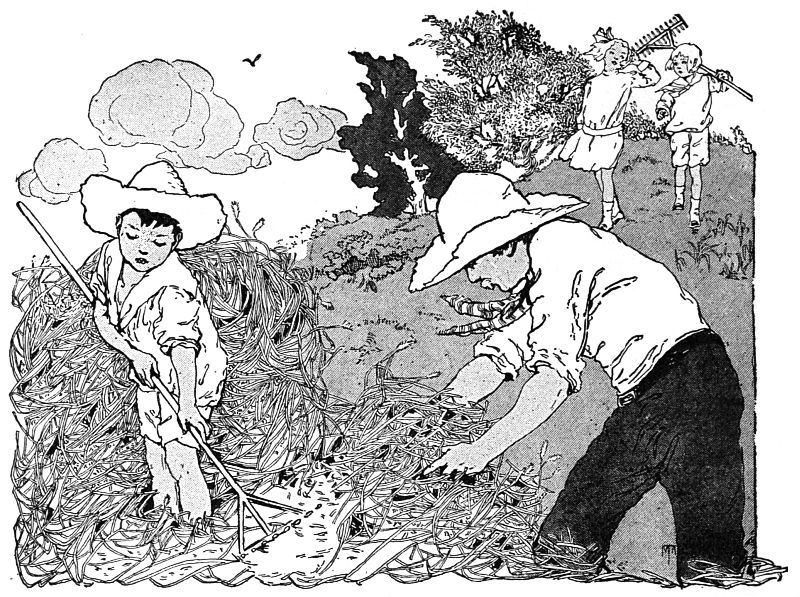
It’s summer, the meadow grass is green.
Father has come to mow the green meadow grass.
“Let me help you, Father,” says Frank.
Father says, “Thank you, my boy.
I like to have you help me.”
| thank | Frank | bank | sank |
Max was going to see Father mow.
He says it is fun to see Father mow.
The little girls were swinging in the orchard.
They saw Max going to the meadow.
He said, “Come and go with me, Alice.”
Then Alice sang,
“Little boy, little boy, where are you going?
I will go with you, if I may.”
Max sang,
“I’m going to the meadow to see them a-mowing.
I’m going to help them cut the hay.”
| hay | day | gay | stay |
| may | say | play | gray |
It is a beautiful summer night.
The air is sweet with clover blooms.
The bright stars shine in the sky.
The birds in the tree tops are asleep.
So are the larks in the meadow.
The baby larks are asleep in the deep grass.
The mother lark is on the pretty nest.
The lambs are asleep in the clover.
The mother sheep are at rest with them.
The bright stars peep down at the larks in the deep grass.
They peep down at the sleeping lambs.
There is a song about the summer night.
It tells about the larks and the lambs.
It tells about the beautiful bright stars.
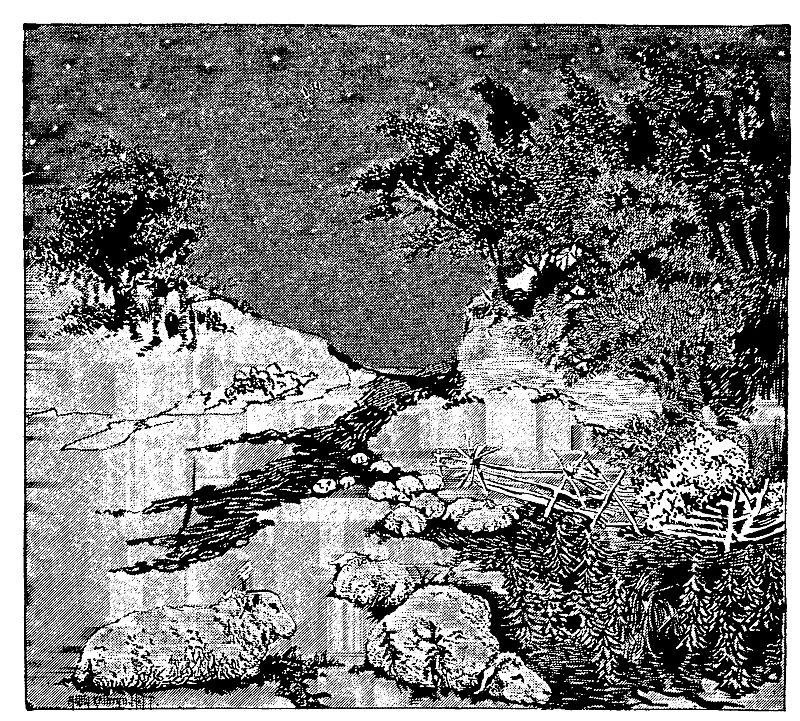
M. S. WILLIS.
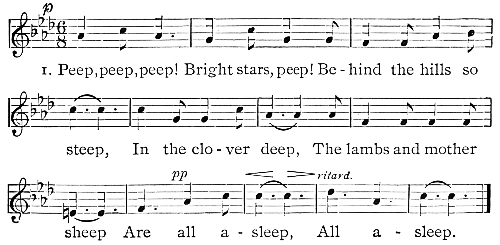
| 1. | Peep, peep, peep! | |
| Bright stars, peep! | peep | |
| Behind the hills so steep, | steep | |
| In the clover deep, | deep | |
| The lambs and mother sheep | sheep | |
| Are all asleep, | sleep | |
| All asleep. | ||
| 2. | Sleep, sleep, sleep! | |
| Birdies, sleep! | sleep | |
| Beneath the soft wings creep, | creep | |
| While the night winds sweep, | sweep | |
| The mother bird will keep | keep | |
| Birdies asleep, | sleep | |
| Safe in sleep. |
One day the children found a mouse in the meadow.
Alice said, “I saw a mouse just now.
It is such a pretty little mouse!
I hope it will come out again.”
“It is a field mouse,” said Father.
“It lives here in the fields and meadows.
It is a cousin to the rats and mice that live in the house.
Another mouse cousin lives in the woods.
I caught one once. It had a nest in the top of a tree.
It sang something like a bird.”
Then Father told the children stories.
One story was about the mouse cousins.
| mouse | house | grouse | souse |
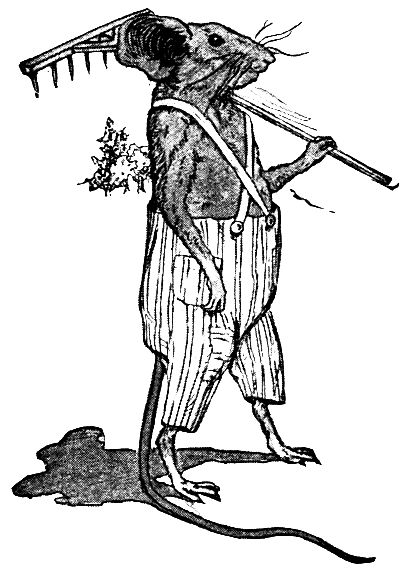
A little mouse lived in a town.
One day he went to see the field mouse.
Such fine fun as the little mice had!
The field mouse said,
“We must have something to eat soon.
I hope you like wheat and corn, Cousin.”
“Are wheat and corn all you have?” said the town mouse.
“Yes,” said the field mouse. “I eat wheat
and corn year after year.”
“Come with me,” said the town mouse.
“I will give you something good to eat.”
| field | yield | shield | wield |
The field mouse was glad to go home with his cousin.
So away the two mice went to town.
Soon they came safely to a fine house.
“This is my home,” said the town mouse.
“Now I will show you the things I eat.”
So they stole into the house, and oh, such good things as they saw!
There were sweet cakes and buns.
There were oranges and apples.
There was pudding, and some meat.
“This is fine!” cried the field mouse.
“Just look at that meat! I do like meat!
I shall not live in the fields again.”
| meat | heat | beat | treat |
| seat | wheat | neat | bleat |
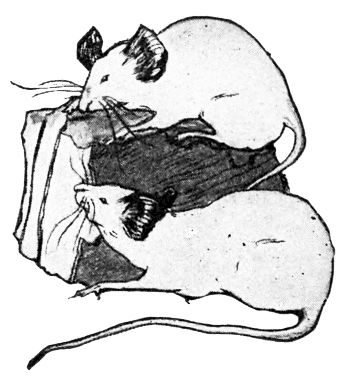
The mice fell to eating meat at once.
A boy with a dog came into the room.
“There is Jack with the dog! Run!” cried the town mouse.
You should have seen the two mice run!
The dog went after them with a growl.
But the mice got to the hole safe.
Then the boy and the dog went out.
Soon the mice ran into the room again.
Just then a girl came in with the broom.
She struck at the mice with the broom.
“There is Jill with the broom!
Run! Hide!” cried the town mouse.
| room | groom | loom | gloom |
| broom | boom | bloom | doom |
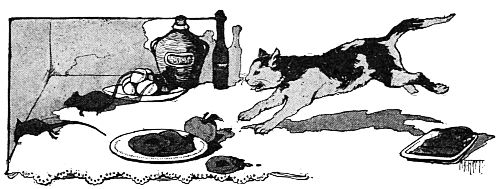
When the girl with the broom had gone the mice stole back again.
The boy stole back into the room, too.
This time he had a black cat with him.
The town mouse cried, “There’s the cat! Jump! Run! Hide!”
Soon the mice were safe in the hole.
Then the field mouse said, “Good-by.
I’m going where corn and wheat grow.
To be sure I have not much to eat.
But I’m safe there. Good-by, Cousin.”
| hole | stole | pole | whole |
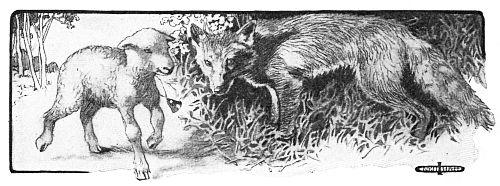
Here is a story that Father told.
Lambikin was a wee happy lamb.
One day Lambikin said,
“I’m going to the other side of the hill.
I’m going to see my granny!”
So he went hopping, jumping and dancing along.
Soon Lambikin saw a fox.
The fox said with a growl, “Lambikin! Lambikin! I’ll eat you!”
| long | way | sleep | side |
| along | away | asleep | aside |
Lambikin looked back and said,
“Don’t eat Lambikin
Till he goes to Grannikin.
Then very fat he’ll grow,
And you can eat him so.”
The fox liked fat lambs, and said,
“Well, go on to your granny’s house.
But be sure to come back this way.”
Away went Lambikin, hopping, jumping and dancing along.
Soon Lambikin saw a wolf.
The wolf said with a howl,
“Lambikin! Lambikin! I’ll eat you!”

Lambikin looked back and said,
“Don’t eat Lambikin
Till he goes to Grannikin.
Then very fat he’ll grow,
And you can eat him so.”
The wolf liked fat lambs,
So he said with a howl,
“Well, go on to your granny’s house.
But be sure to come back this way.”
Away went Lambikin, hopping, jumping and dancing along.
Soon Lambikin met a lion.
The lion said with a roar,
“Lambikin! Lambikin! I’ll eat you!”
| howl | cowl | prowl | fowl |
| growl | scowl | jowl | owl |

Lambikin looked back and said,
“Don’t eat Lambikin
Till he goes to Grannikin.
Then very fat he’ll grow,
And you can eat him so.”
The lion liked fat lambs.
So he said with another roar,
“Well, go on to your granny’s house,
but be sure to come back this way.”
Away went Lambikin, hopping, jumping and dancing along.
At last he came to kind old Granny’s house.
Lambikin called, “I’m here, Grannikin!
I’ve come to eat grass and grow fat.”
And then yon should have seen him eat!
At last Granny said, “Lambikin, my pet, you are as fat as you can be.
You must go home to-morrow.”
Then Lambikin said, “What shall I do?
The fox, the wolf and the lion like just such fat lambs as I am.
They will be sure to eat me to-morrow.”
“No, no,” said kind old Granny.
“You shall go in a sheep skin drum.”
So Granny made a drum of sheep skin.
She put Lambikin in the sheep skin drum and said, “Now roll away, my pet.”
| call | called | roll | rolled |
Lambikin went rolling along and met the lion.
The lion could not see Lambikin.
So he roared,
“Drumikin! Drumikin!
Have you seen Lambikin?”
Lambikin called out,
“Fallen into the fire, and so will you.
On, little Drumikin! Tum-tum-too!”
“The woods must be on fire,” said the lion with a roar.
Away he ran as fast as he could go.
Lambikin went rolling along and met the wolf.
The wolf could not see Lambikin.
So he said with a howl,
“Drumikin! Drumikin!
Have you seen Lambikin?”
Lambikin called out,
“Fallen into the fire, and so will you.
On, little Drumikin! Tum-tum-too!”
“The woods are on fire,” said the wolf.
Away he ran as fast as he could go.
Lambikin went rolling along and met the fox.
The fox could not see Lambikin.
So he growled,
“Drumikin! Drumikin!
Have you seen Lambikin?”
Lambikin called out,
“Fallen into the fire, and so will you.
On, little Drumikin! Tum-tum-too!”
“Lambikin is in that Drumikin as sure as I’m a fox.
And Drumikin is nothing but an old sheep skin,” said the fox.

“I’ll soon stop your ride, Mr. Lambikin,” said the cunning fox.
With a howl he ran after Lambikin as fast as he could go.
But the drum was rolling safely along.
Down the side of the hill it went.
The fox could hear Lambikin as he sang,
“I’m in the Drumikin! Tum-tum-too!
I’m safe at home. How do you do?”
| side | ride | pride | wide |
| hide | bride | bide | slide |
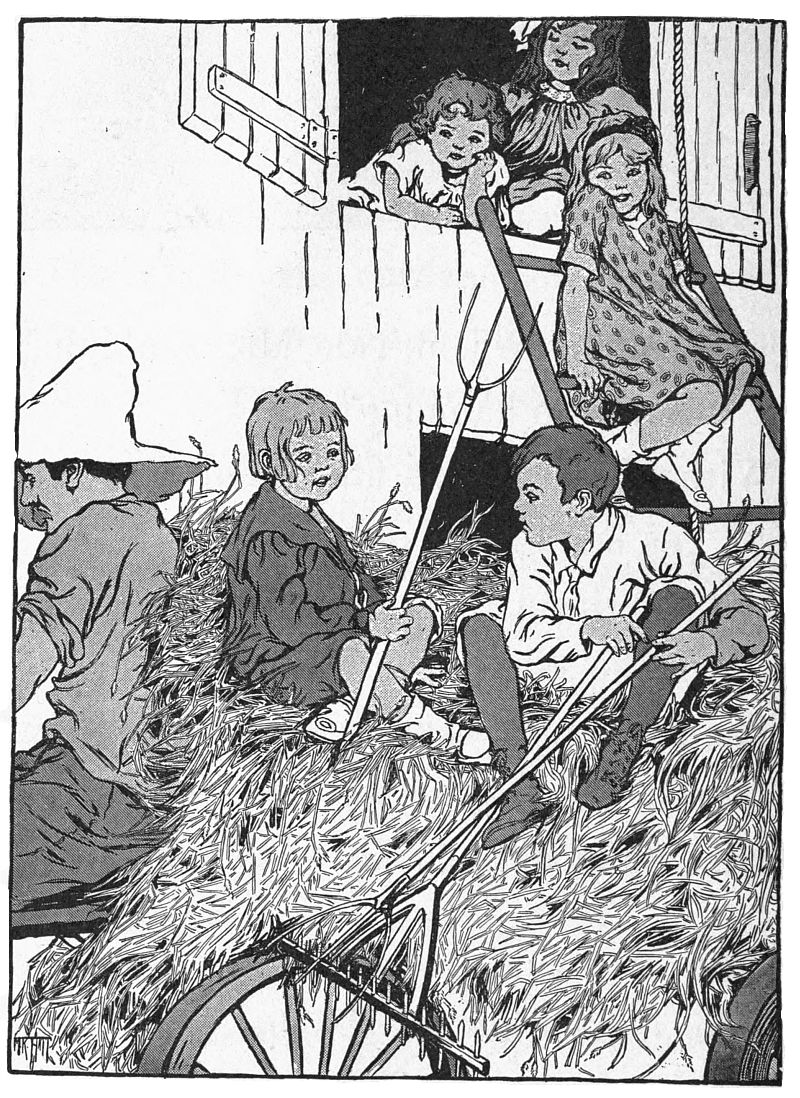
Do you see the children in the stable?
They like this big old stable.
It is a fine place for play.
There is a big hayloft in the stable.
The children like to play in the hayloft.
They go up to the hayloft by a ladder.
Little Betty can walk up the ladder.
Do you see Alice on the ladder?
Grace and Betty are watching Father from the hayloft.
He will pitch the hay into the hayloft.
Frank and Max have had a ride on the hay.
Now they will run up the ladder and play in the hayloft.
| place | lace | Grace | race |
The girls are in the garden.
There are beautiful flowers in the garden.
There are red and white flowers.
There are red roses and rosebuds.
There are no bright yellow daffodils.
There are beds of blue violets.
Alice is gathering violets for somebody.
She is gathering roses, too.
She is gathering them for Mother.
Betty is looking at the rosebuds.
Grace says, “Look at the rosebuds, Betty.
They will soon bloom into big roses.
Do you know what the rosebuds say?
The wind makes the rosebuds say,
‘How do you do, little girl?’
You must say, ‘How do you do?’ ”
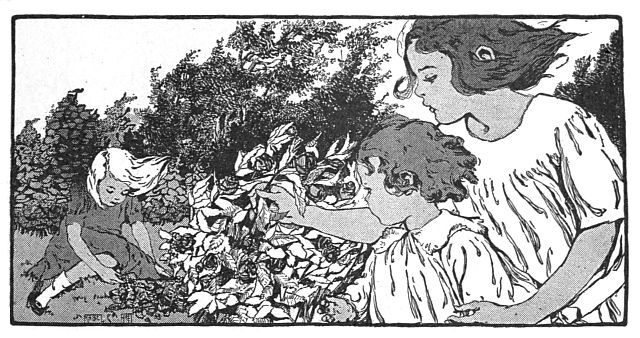
Good-morrow, pretty rosebuds.
I pray you tell me true,
To be as sweet as the red, red rose,
What must a body do?
To be as sweet as a red, red rose,
A little girl like you
Just grows, and grows, and grows, and grows.
And that’s what she must do.
—Mary Mapes Dodge.
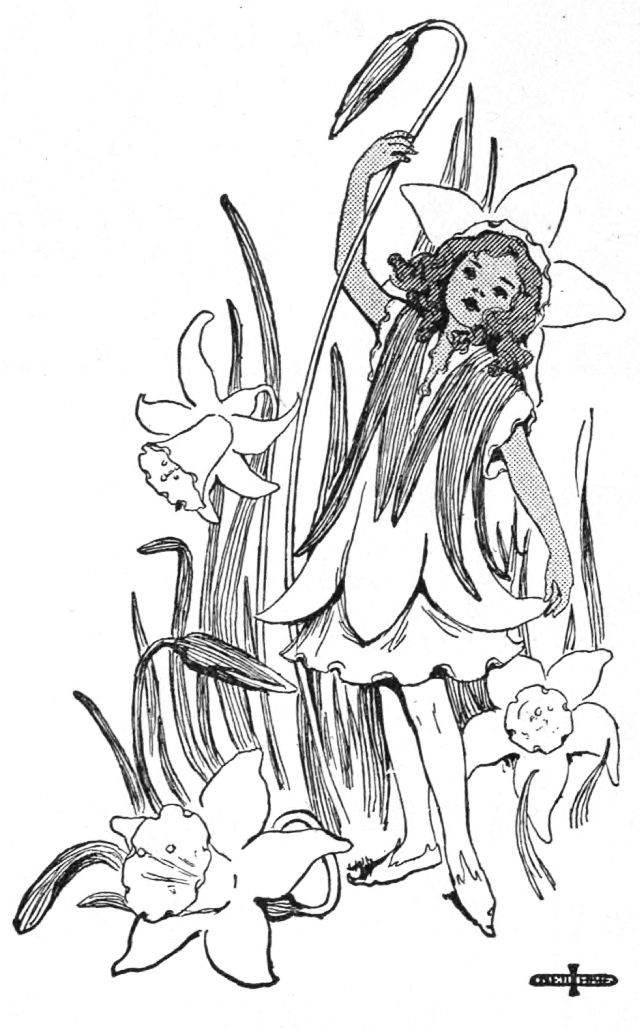
Now here is little Daffydowndilly.
Little Daffydowndilly is a daffodil,
See Daffydowndilly’s yellow bonnet.
See her green gown.
Daffydowndilly has come up to town,
In a yellow bonnet
And a green gown.
| now | town | down | frown |
| how | gown | brown | drown |
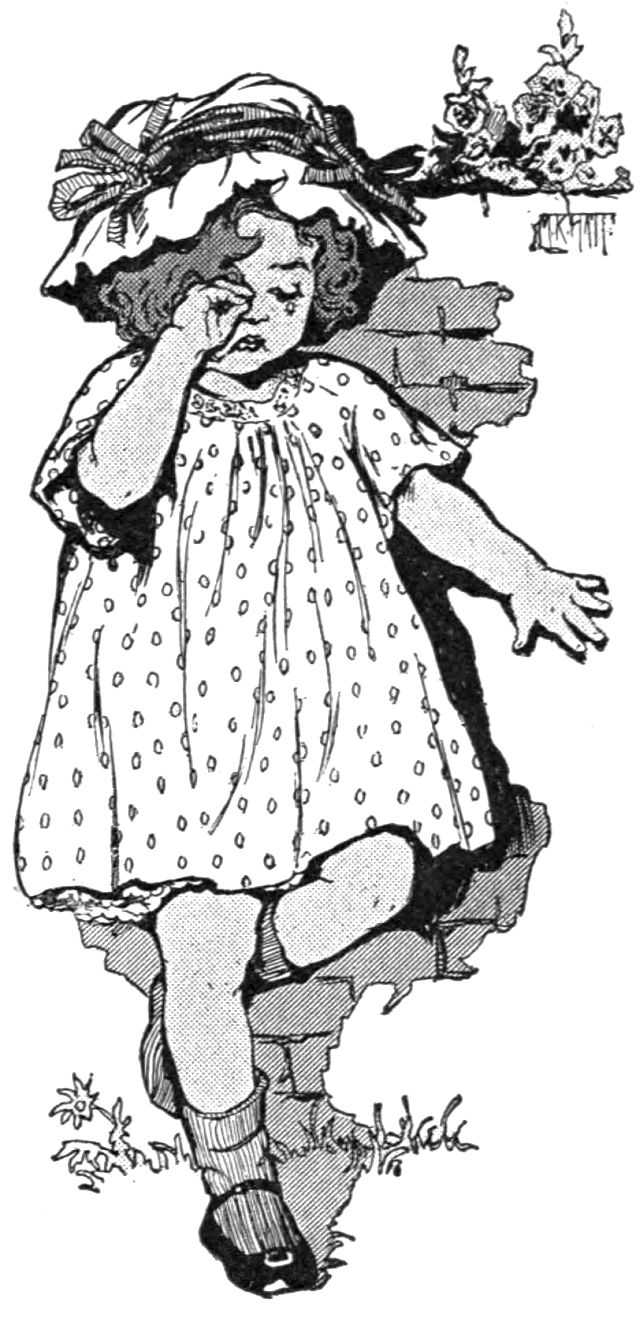
Betty’s bonnet isn’t like Daffydowndilly’s.
Betty’s bonnet is blue to match her eyes.
Betty has a blue gown to match her blue bonnet.
She has blue shoes, too.
Father sings to Betty,
“Little Betty Blue
Lost her little shoe.
What can little Betty do?
Give her another
To match the other,
And then she may walk in two.”
| lost | cost | frost |
Alice, let us play Queen in the Garden.
Betty shall be the queen in the garden.
The queen has no bonnet.
She must have a crown.
Will the little green vine make a crown?
No, we will make a crown of violets.
Put daffodils on the queen’s gown.
Put rosebuds around her neck.
The rosebuds are her diamonds.
Am I the little girl in the garden, Grace?
Yes. You are to say you have been gathering flowers for the queen.
You must say that she gave you a diamond as big as your shoe.
| queen | green | sheen | ween |
| seen | preen | keen | screen |
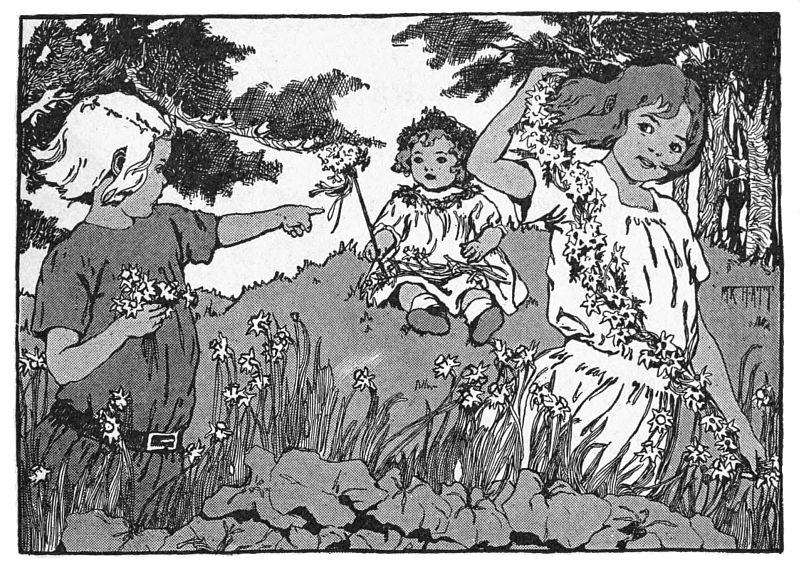
| Grace: | Little girl, little girl, |
| Where have you been? | |
| Alice: | I’ve been gathering roses |
| To give to the queen. | |
| Grace: | Little girl, little girl, |
| What gave she to you? | |
| Alice: | She gave me a diamond |
| As big as my shoe. |
The children were watching the rain.
They said, “We want to go to the meadow.
We want to go and play.”
Then they sang, “Rain, rain,
Go away.
Come again, Some other day.
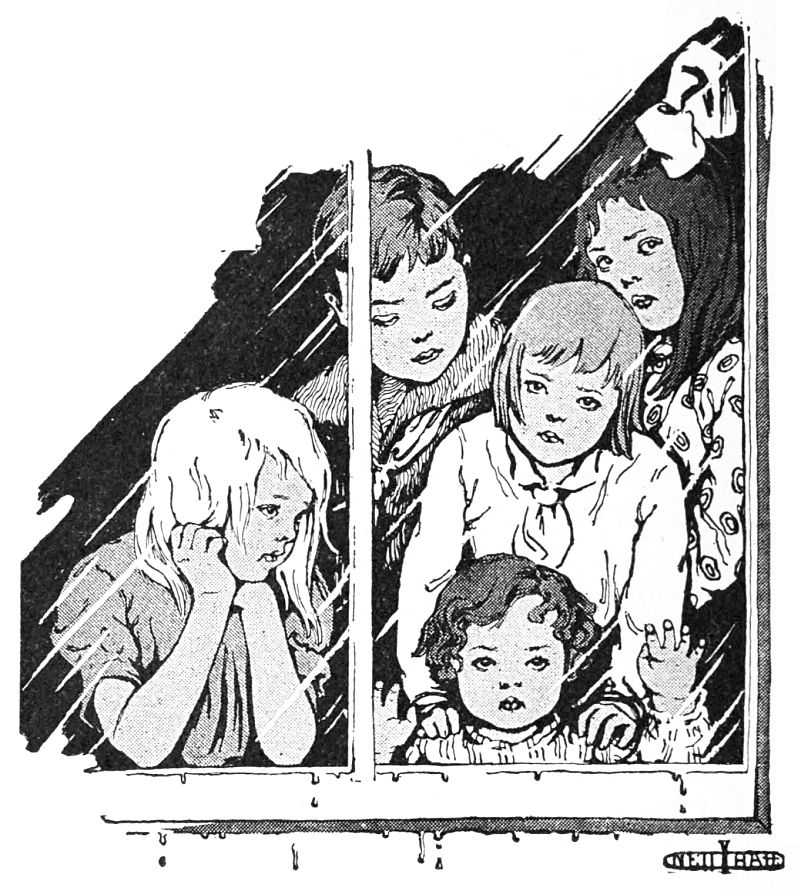
Little children want to play,
In the meadow on the hay.
Rain, rain, go to Spain,
Be sure you don’t come back again.”
| rain | Spain | grain | vain |
Alice said, “I don’t like the rain.”
Max said, “I want to see the sun shine.”
Mother said, “Don’t fret about the rain.
You should sing and not fret.
The rain makes the flowers grow.
We should fret if there were no flowers.”
Then mother sang the rain song.
“It is not raining rain to me.
It’s raining daffodils.
In every little drop, I see
Field flowers on the hills.
And here is to the happy.
A fig for him who frets.
It is not raining rain to me.
It’s raining violets.”

Let it rain. We can read and tell stories.
We will read in our story book.
No, get Betty’s Mother Goose book.
We will look at the pictures in the book.
Betty likes the Mother Goose pictures.
We will find the pictures for her.
Come, look at your Mother Goose book, my little Betty.
We will read the rimes of Mother Goose.
We can read the rimes and play them.
| book | look | rook | crook |
| took | cook | brook | shook |
See the beggars coming to town.
See the beggars in velvet gowns.
Some are in rags and tags.
Hark! How the dogs bark and growl!
Hark! Hark!
The dogs do bark.
The beggars are coming to town.
Some in rags,
Some in tags,
And some in velvet gowns.
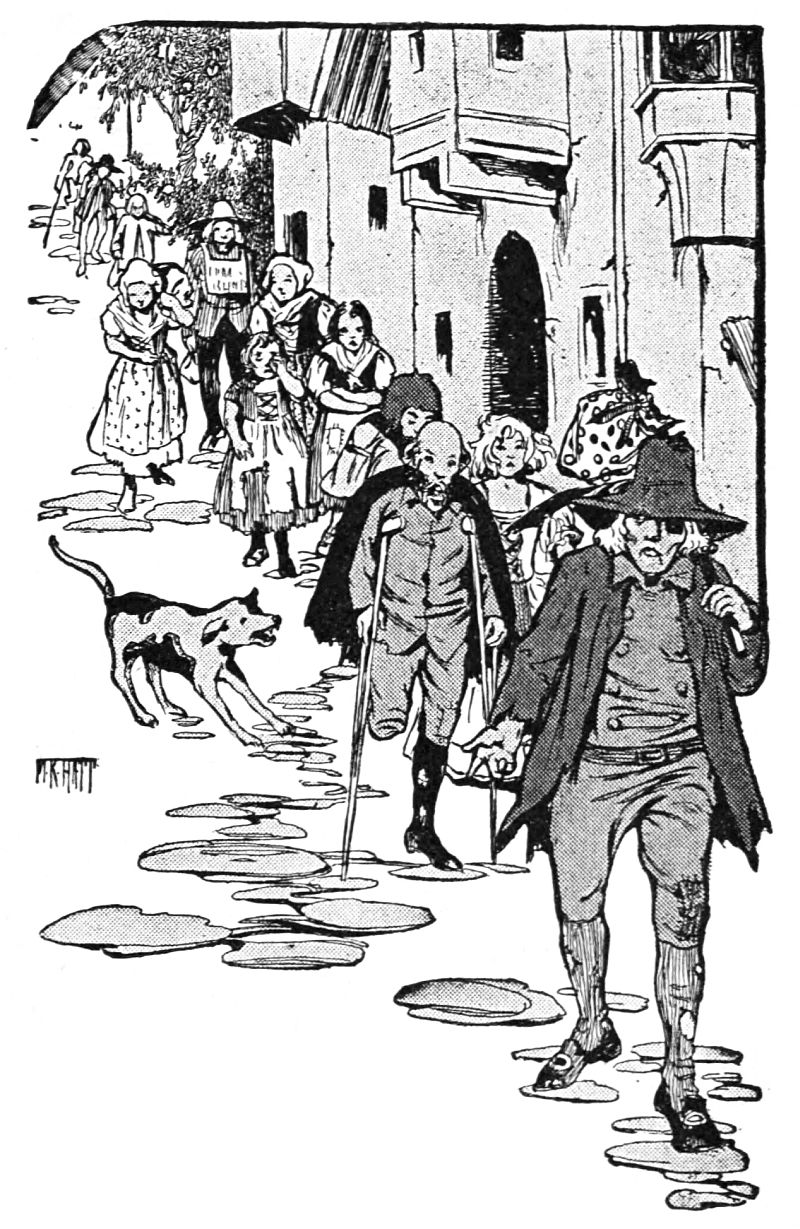
| hark | lark | rags | flags |
| bark | dark | tags | bags |
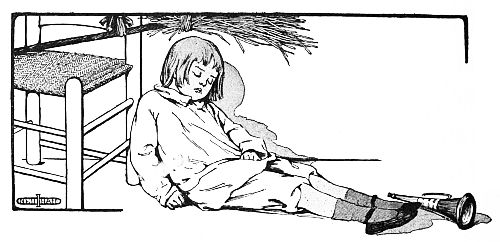
Let us play Boy Blue. Max is Boy Blue.
Here is your horn, Max.
Alice, you must wake Boy Blue.
You must say, “Where is the little boy?”
Then Frank must say,
“He’s under the haystack fast asleep.”
The broom and this chair will make a fine haystack.
| horn | born | thorn | for |
| corn | lorn | morn | nor |
| Alice: | Little Boy Blue, |
| Come blow your horn. | |
| The sheep are in the meadow. | |
| The cows are in the corn. | |
| Where’s the boy who looks after the sheep? | |
| Frank: | He’s under the haystack fast asleep. |
| Alice: | Will you wake him? |
| Frank: | Oh, no, not I, |
| For if I do, he is sure to cry. |
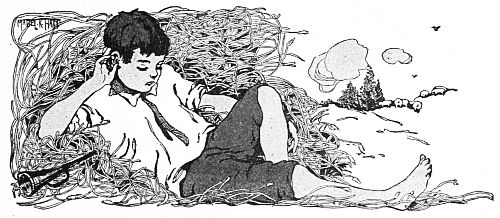
Now let us play Pussy-Cat and the Queen.
Max and Grace must say the rime.
Grace is Pussy-Cat. She will answer Max.
Betty is the frightened mouse. She must run when Grace jumps at her.
Alice is the Queen this time.
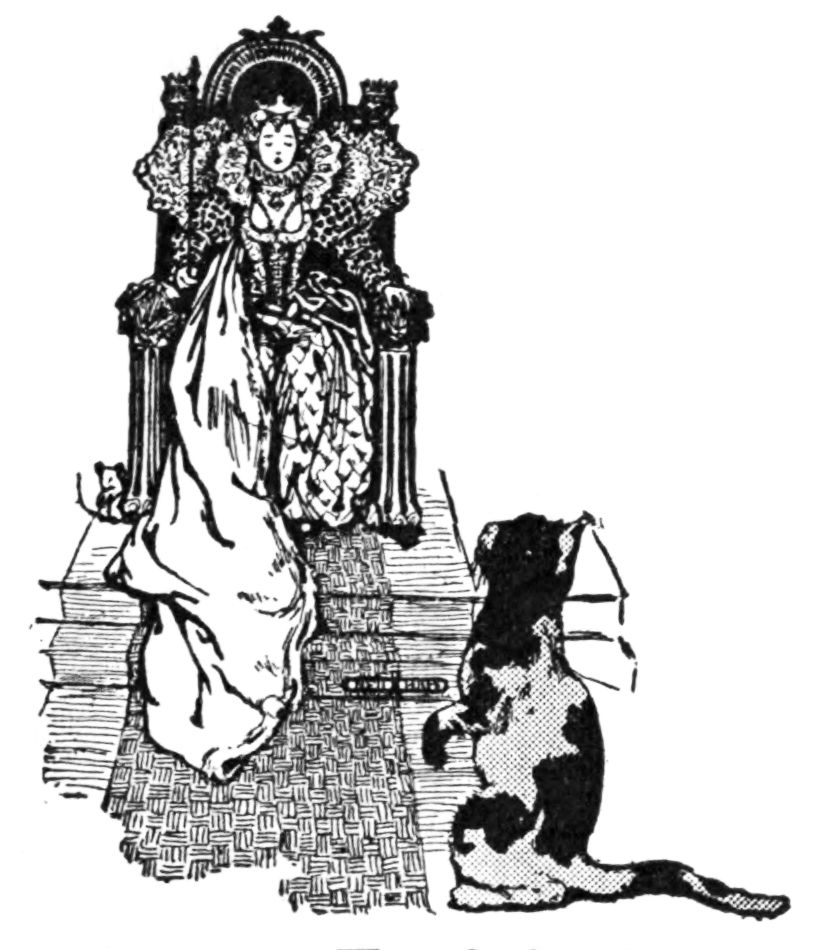
| Max: | Pussy-Cat, Pussy-Cat, |
| Where have you been? | |
| Grace: | I’ve been to London |
| To see the Queen, | |
| Max: | Pussy-Cat, Pussy-Cat, |
| What did you there? | |
| Grace: | I frightened a little mouse under the chair. |
| time | dime | chime | clime |
| rime | prime | lime | slime |
Pussy-Cat went to London to buy a hat.
Now she is coming back from London.
Her three kittens went with her.
They went to London to buy mittens.
Let us play “Coming from Town.”
I am Mrs. Pussy-Cat, you know.
Yes, Grace, and you have a straw hat.
In the picture, Mrs. Pussy has on a big straw hat.
Max, Betty and Alice are the three kittens.
Your hands are your paws, Betty.
You must have mittens on your paws.
Frank must say to me, “Where have you been, Mrs. Pussy-Cat?”
He must say to Max, Betty and Alice,
“Where have you been, little kittens?”
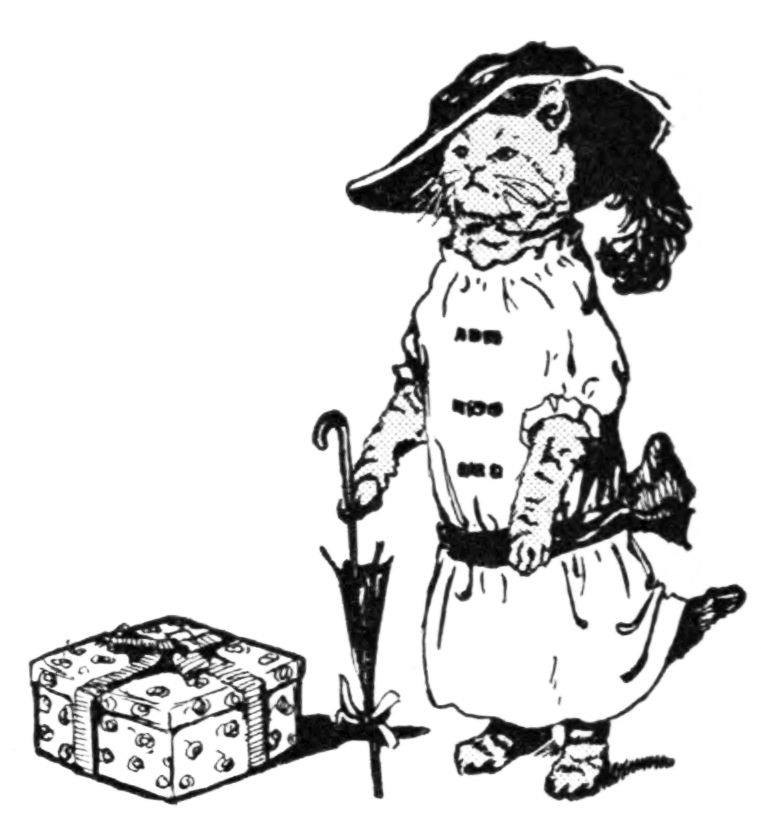
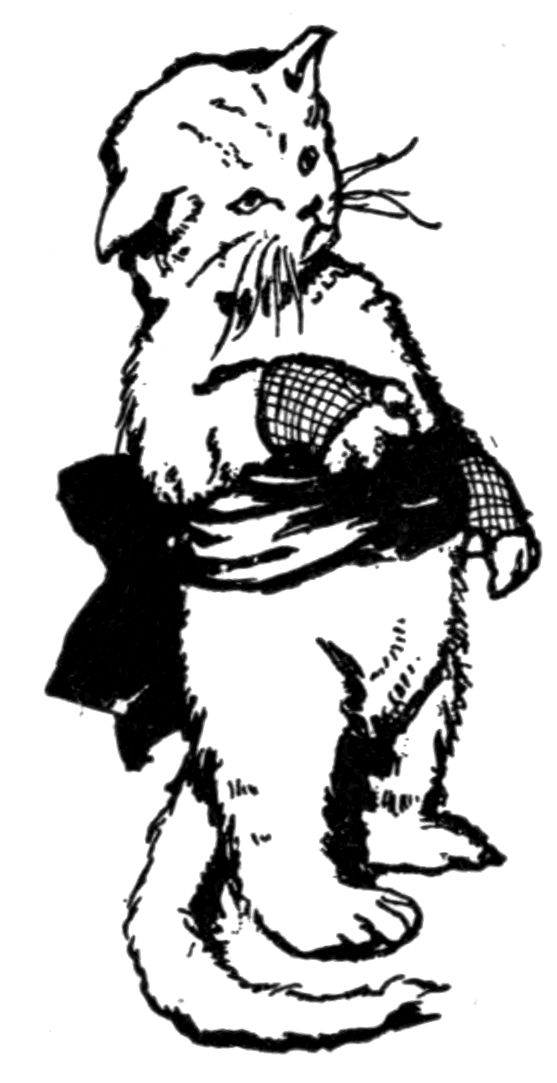
| Frank: | Where have you been, |
| Mrs. Pussy-Cat? | |
| Grace: | I’ve been to London |
| to buy me a hat. | |
| Frank: | What! a hat |
| for a cat? | |
| Who ever did see | |
| A cat in a hat? | |
| Frank: | Where have you been, |
| My little kittens? | |
| The others: | We’ve been to |
| London | |
| To buy us some | |
| mittens. | |
| Frank: | What! mittens |
| for kittens? | |
| Who ever did see | |
| Kittens in mittens? |
The three little kittens lost their mittens.
Frank may tell what the kittens did.
Alice, Max and Betty are the kittens.
They must say what the bad kittens did.
Alice, write down what the kittens say.
Tell Betty how to say it.
The three kittens must show their paws without the mittens they had at first.
They cry about their mittens.
When they find their mittens they jump and dance.
I am Mrs. Pussy-Cat, you know.
What shall we have for a pie?
You know Mrs. Pussy made a pie.
Take this pan for the pie, Alice.
| pie | tie | die | lie |
| Frank: | The three little kittens |
| Lost their mittens, | |
| And they began to cry. | |
| The Others: | Oh, Mother dear, |
| We very much fear | |
| That we have lost our mittens. | |
| Grace: | What! Lost your mittens? |
| You bad, bad kittens! | |
| Then you shall have no pie. | |
| The Others: | Mee-ow, mee-ow, mee-ow! |
| Grace: | No, you shall have no pie! |
| The Others: | Mee-ow, mee-ow, mee-ow! |
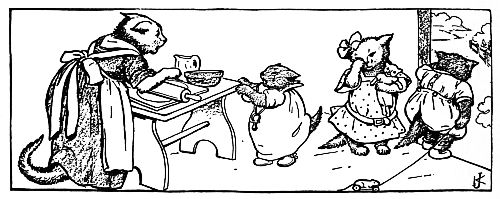
| Frank: | The three little kittens |
| Found their mittens, | |
| And they began to cry, | |
| The others: | Oh, Mother dear, |
| See here, see here! | |
| See, we have found our mittens. | |
| Grace: | What! Found your mittens? |
| You dear, dear kittens! | |
| Then you shall have some pie! | |
| The Others: | Purr-r, purr-r, purr-r! |
| Oh, let us have the pie! | |
| Purr-r, purr-r, purr-r! |
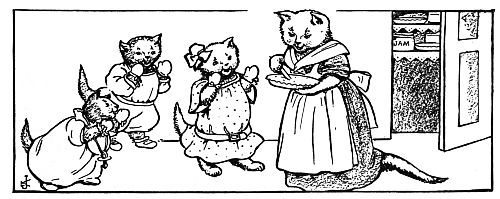
One day it was raining, and Grace said,
“Let us read about the Gingerbread Boy.”
Once there was a little old woman and a little old man.
They lived in a little old house by the wood.
They had a little old kettle and a little old pan.
They had a little old dog whose name was Dan.
They had a little old cow whose name was Fan.
And they were very, very kind to their pets.
| kind | mind | blind | find |
| bind | hind | rind | wind |
One day the little old woman was making some gingerbread.
She said, “I wish we had a little boy to eat this gingerbread.”
“I wish we had a little boy, too,” said the little old man.
“I could love a little boy very much.”
“I’ll cut this cake to look like a boy,” said the little old woman.
So the little old woman cut a cake to look like a boy.
She said, “I’ll put the cake in the little old pan to bake.
When it is done, I’ll take it up in the little old dish.”
| dish | fish | wish | swish |

The little old woman put the cake into the pan to bake.
When it was done, she said, “The cake is done.
I’ll take it up in the little old dish.”
But the Gingerbread Boy made a jump in the air and over the dish.
Then he went rolling away.
The little old kettle ran after him.
So did the little old pan.
Then the little old woman ran after him.
So did the little old man.
But they never could catch him.
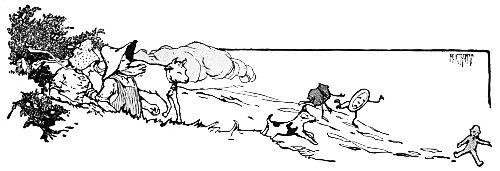
The Gingerbread Boy ran by the little old dog whose name was Dan.
He cried out to the dog,
“I’ve run away
from the little old kettle
and the little old pan,
the little old woman
and the little old man.
I can run away from you, too-oo!
I can, and I can.”
Then the dog ran after him, but he never could catch him.
The Gingerbread Boy ran by the little old cow whose name was Fan.
The Gingerbread Boy cried out to the cow,
“I’ve run away
from the little old kettle
and the little old pan,
the little old woman
and the little old man,
and the little old dog
whose name is Dan.
I can run away from you, too-oo!
I can, and I can.”
Then the cow ran after him, but she never could catch him.
The Gingerbread Boy ran on and on.
At last he came to the dark wood.
There he saw a poor little boy crying.
The poor little boy had no home, and he had nothing to eat.
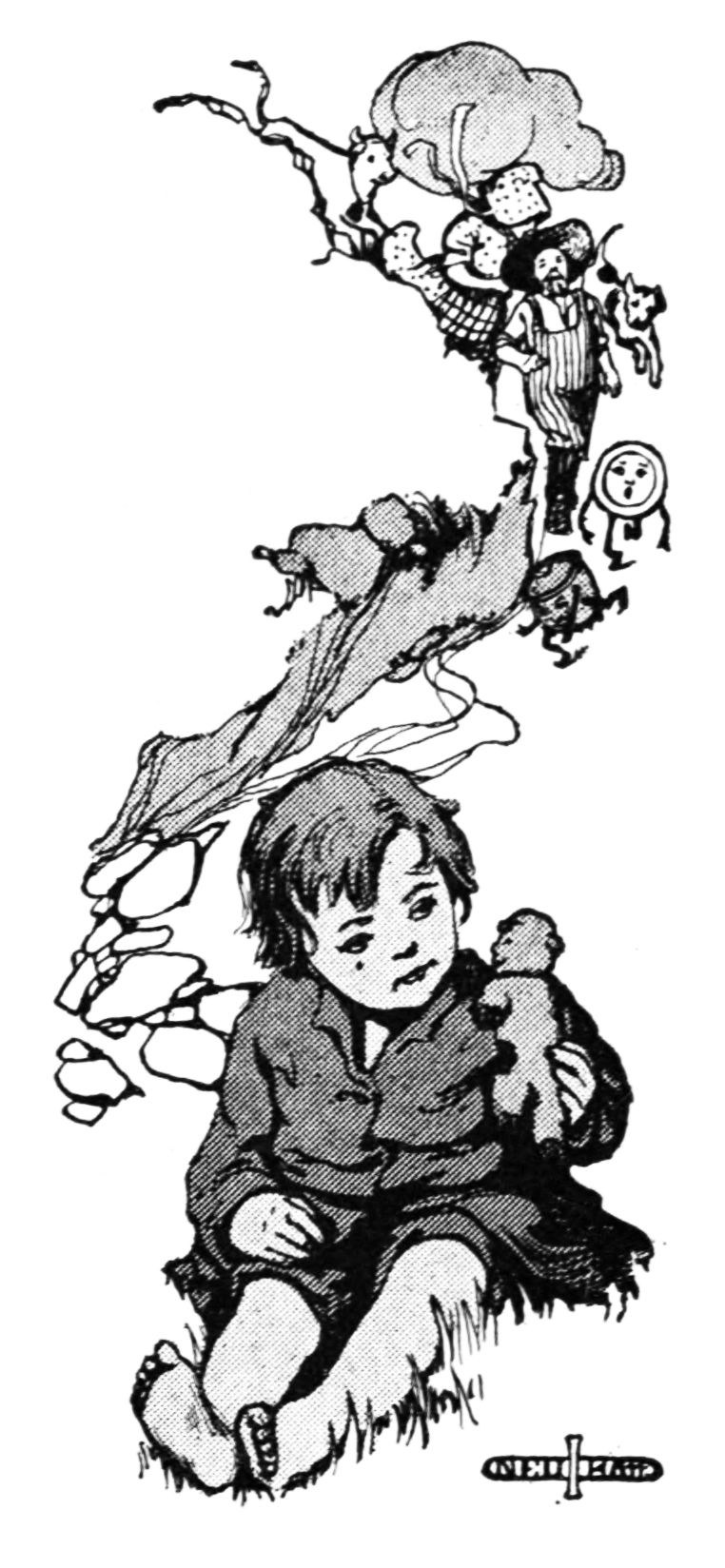
The Gingerbread Boy cried.
“I’ve run away
from the little old kettle
and the little old pan,
the little old woman
and the little old man,
the little old dog
whose name is Dan,
and the little old cow
whose name is Fan.
I can run away from you, too-oo!
And I will if you don’t eat me.
Eat me as quick as you can.”
The little boy said, “Thank you, I will.”
Soon the Gingerbread Boy said,
“I’m going! I’m half gone!
I’m all gone.” And so he was.
Up came the little old woman and the little old man.
With the little old kettle came the little old pan.
With the little old dog, whose name was Dan, came the little old cow, whose name was Fan.
They all said at once,
“Have you seen the Gingerbread Boy?”
“Yes,” said the little boy, “he told me to eat him.”
“Poor little boy!” they all said at once.
“Come along with us and be our boy.”
“I should like that!” said the little boy.
So they all went back to live
in the little old house by the dark wood.
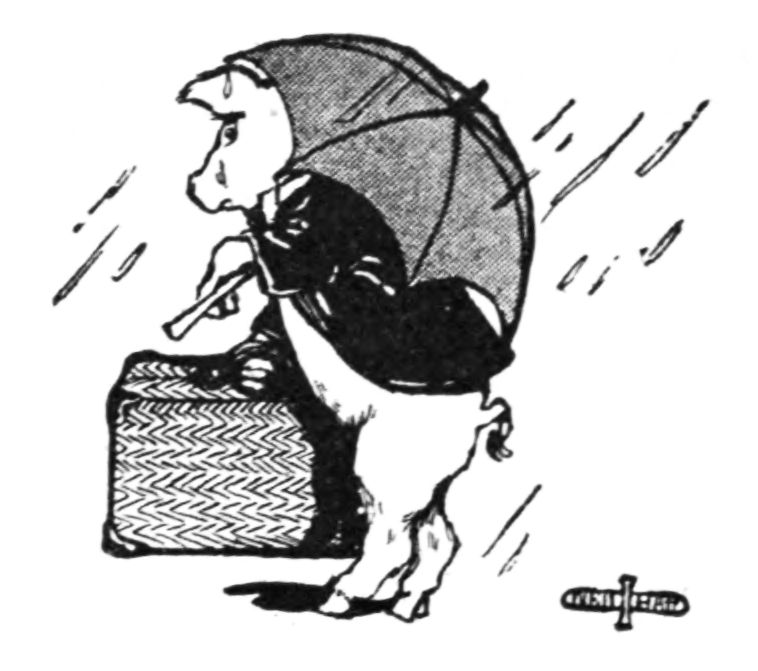
A pig with a curly tail lived in a rail pen.
One rainy day he said, “I don’t like to live in a rail pen that leaks.
I’m going to the woods to build me a house that will never leak.”
On his way to the woods he met a rabbit.
“Good morning, Rabbit,” said the pig.
“Good morning, Pig,” said the rabbit.
“Where are you going this rainy day?”
“I’m going to the woods to build me a house that will never leak.
I don’t like to live in a rail pen,” said the pig with the curly tail.
| tail | rail | trail | wail |
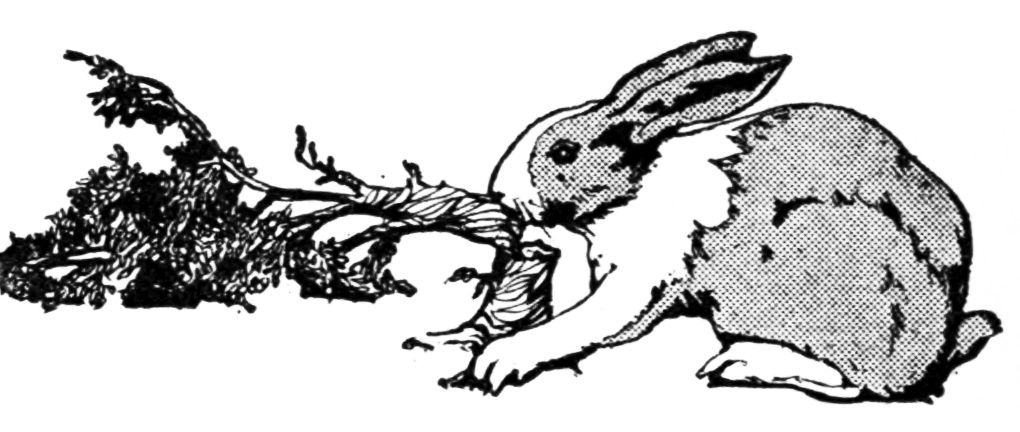
The rabbit said,
“May I go with you?”
“Can you help build my house?” said the pig.
“I fear you can not do much but hop.”
“I have very sharp teeth,” said the rabbit.
“I can cut down the trees with my sharp teeth.”
“Well, come along with me,” said the pig.
On their way they met a duck.
“Good morning, Duck,” said the pig.
“Good morning, Pig,” said the duck.
“Where are you going this rainy day?”
“I’m going to the woods to build me a house that will never leak.
I don’t like to live in a rail pen,” said the pig with the curly tail.
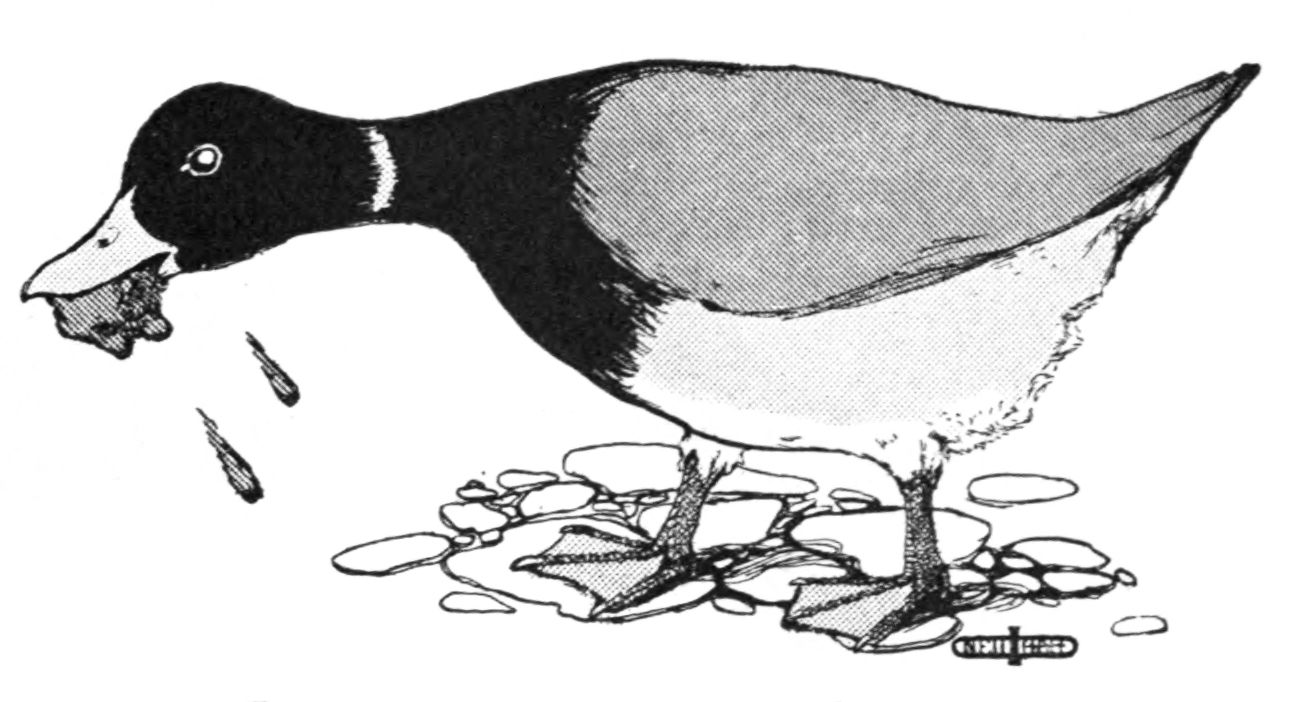
The duck said,
“May I go with you?”
“What can you do to help build my house?” said the pig.
“I fear you can not do much but quack.”
“You will want plaster,” said the duck.
“I can make plaster and carry it.”
“Well, come along with me,” said the pig.
“I’ll take you to make plaster for me.”
On their way they met a rooster.
“Good morning, Rooster,” said the pig.
“Good morning, Pig,” said the rooster.
“Where are you going this rainy day?”
“I’m going to the woods to build me a house that will never leak,” said the pig with the curly tail.
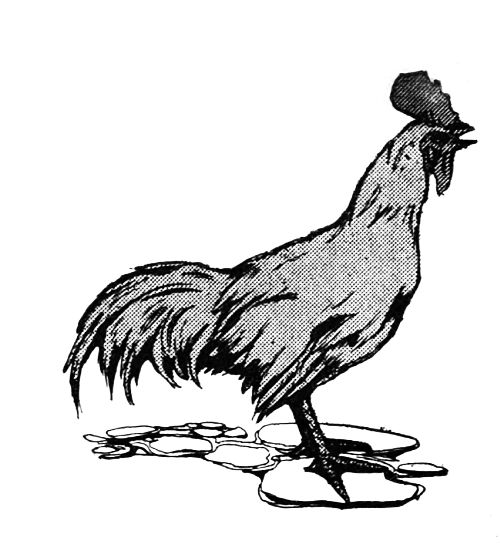
The rooster said,
“May I go with you?”
“What can you do to help?” said the pig.
“Well,” said the rooster,
“I can sing so that all the world can hear.
I will sing with all my might and wake you every day in the year.”
“Well, come along with me,” said the pig.
“I’ll take you to sing and wake us.”
So they all went on to the woods.
There they soon made a house that will never leak.
| hear | year | near | clear |
| fear | dear | tear | rear |
Cock-a-doodle-doo!
My dame has lost her shoe.
My master’s lost his fiddling stick,
And knows not what to do.
Cock-a-doodle-doo!
What is my dame to do?
Till master finds his fiddling stick,
She’ll dance without her shoe.
Cock-a-doodle-doo!
My dame has found her shoe,
And master’s found his fiddling stick.
Sing Cock-a-doodle-doo!
My dame will dance with you,
While master fiddles his fiddling stick
For dame and doodle-doo!
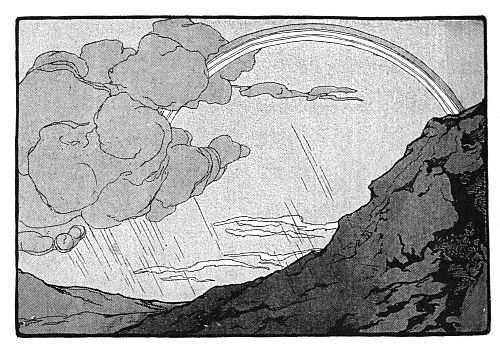
Look at the beautiful rainbow in the sky.
It is raining while the sun shines.
The sun shines through the clouds.
It shines on the drops of rain.
The sun and the rain make the rainbow.
Don’t you think the rainbow looks like a bridge?
You shall hear the story of the Beautiful Bridge.
Once a king had a beautiful daughter whose name was Iris.
The king lived with Iris in the sky.
Iris had a beautiful queen mother.
She did not live in the sky.
She lived on the top of a high mountain.
The king and the queen met on the high mountain.
There they made beautiful things from the clouds.
They made them for Iris.
They made them of the beautiful colors that Iris loved.
The colors were red, orange, yellow, green, blue and violet.
They are the colors that you see in the rainbow.
The king and queen made a beautiful bridge for their daughter Iris.
It was made of orange and violet and the other colors that Iris loved.
Iris went up and down over her bridge.
The bridge was so made that Iris could drop it to the mountains.
She could lift it again to the sky.
It was said that Iris once hid a pot of gold.
She hid it at the foot of her bridge.
Shouldn’t you like to find it?
Do you think you could find the foot of the bridge?
Have you ever seen the beautiful bridge?
| bridge | ridge | midge |
I see some sheep that are white, white, white.
I see a horn that is bright, bright, bright.
I see a meadow that is blue, blue, blue.
And what I tell you is true, true, true.
Can you answer this riddle?
The answer to the riddle is in the sky.
The sheep so white are the clouds.
The horn so bright is the moon.
The meadow so blue is the sky.
| true | blue | flue | glue |
Have you seen the sunset sky?
The colors are orange and gold at first.
Have you seen the rosy clouds grow more and more rosy?
Do you watch for the first star in the sunset sky?
Do you ever make a wish when you see the first star after sunset?
Here is a pretty rime to say when you see the first sunset star.
Star light, star bright,
The first star I’ve seen to-night,
I wish I may, I wish I might
Have the wish I wish to-night.
| light | might | right | fright |
| night | fight | bright | knight |
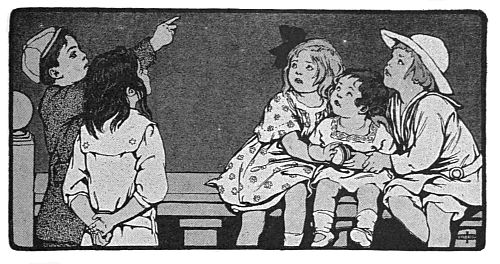
Twinkle, twinkle, little star.
How I wonder what you are,
Up above the world so high,
Like a diamond in the sky!
When the great round sun is set,
When the grass with dew is wet,
Then you show your little light,
Twinkle, twinkle, all the night.
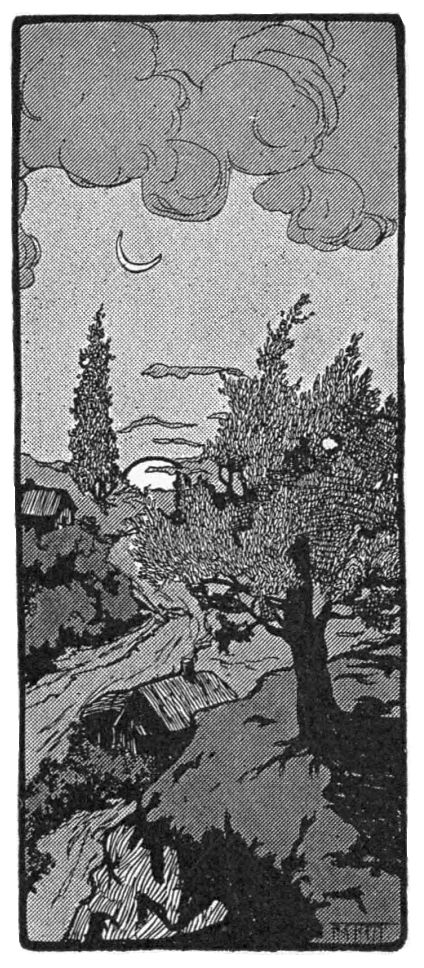
I wonder who can answer this riddle.
It is about a silver boat that is afloat.
I think you can answer this riddle.
One, two, three,
A bonny boat I see,
A silver boat,
And it’s afloat
Upon a rosy sea.
One, two, three,
I’ll answer it for thee.
The moon afloat
Is the bonny boat.
The sunset is the sea.
| boat | float | coat | goat |
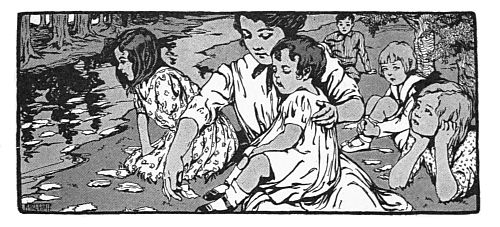
Mother and the children are in the wood.
They will rest by the little brook and tell stories.
The trees are bright red and golden yellow.
Mother says it is a golden day.
Grace says, “See the leaves falling on the brook.
The beautiful yellow leaves are like golden boats afloat.”
| gold | wood | bright | fall |
| golden | wooden | brighten | fallen |
“Stop, stop, pretty water!”
Said Mary one day,
To a bright happy brook
That was running away.
“You run on so fast!
I wish you would stay,
My boat and my flowers
You will carry away.
But I will run after,
Mother says that I may;
For I would know where
You are running away.”
So Mary ran on,
But I have heard say
That she never could find
Where the brook ran away.
A woodman stood chopping the boughs from a tall oak tree.
Deep water was at the foot of the tree.
As the woodman stood chopping, his ax fell into the deep water.
He looked into the dark water and cried,
“Oh, what shall I do?
I have lost my good, sharp ax.”
A kind fairy lived in the water.
She came up out of the water.
“Why do you cry, my poor man?” said the kind fairy.
“My ax fell into the water,” said the poor woodman.
“I can not work without it.”
| wood | stood | good | hood |
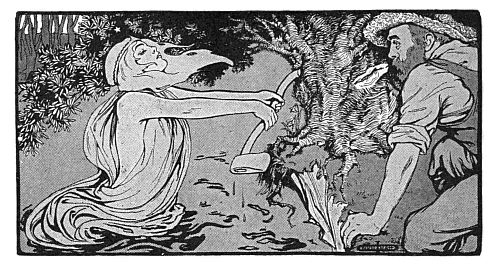
“I will get your ax,” said the fairy.
She went down into the dark water and came up with a silver ax.
“Here is your ax,” said the fairy.
“That is not my ax,” said the man.
The fairy went down deeper into the water.
Soon she came up with an ax of gold.
“Is this your ax?” said the fairy.
“No, oh, no!” said the woodman.
The fairy went down still deeper into the dark water.
She came up with the woodman’s old ax.
“Oh, thank you,” said the honest man.
“That is my ax. Now I can work.”
“Why would you not take the silver ax or the golden ax?” said the fairy.
“The silver ax was not my ax.
Neither was the golden ax my ax,” was the honest woodman’s answer.
“You are a very honest man,” said the fairy.
“Carry the silver ax and the golden ax with you. I give them to you.”
| deep | dark | sharp | old |
| deeper | darker | sharper | older |
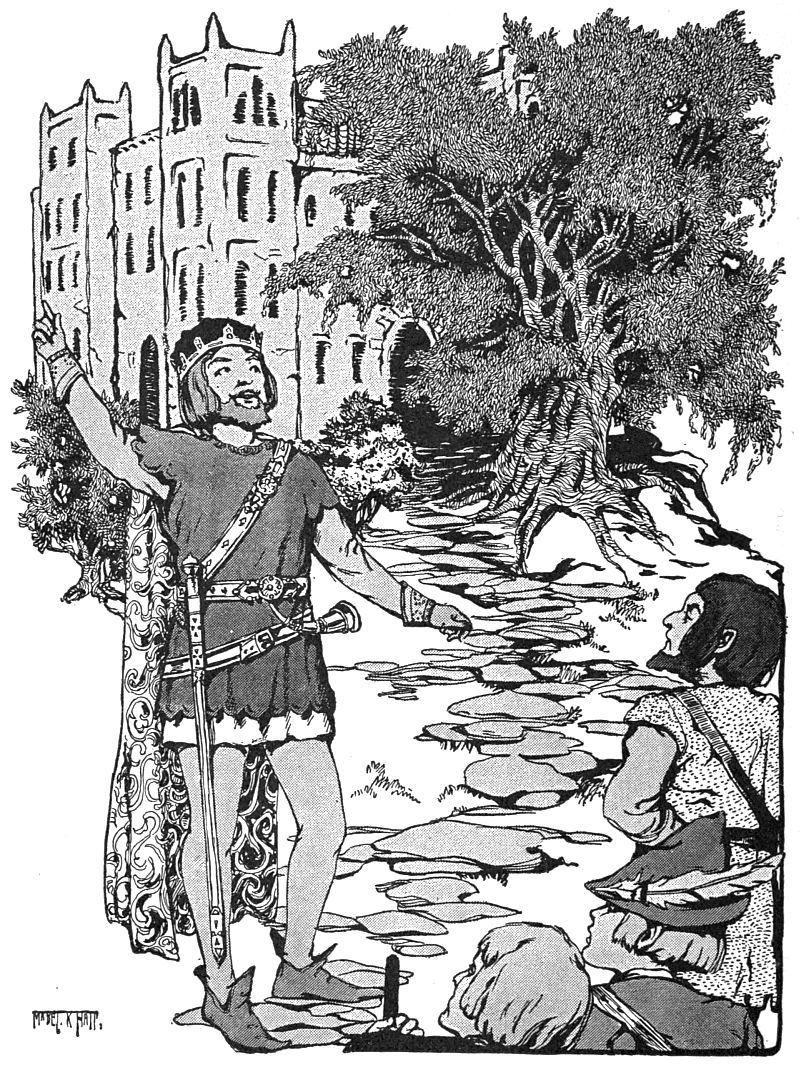
Once a king had a beautiful castle.
There was not such another castle in all the world.
Now a great tree grew near the castle.
It had stood there for a hundred years.
It had more than a hundred boughs.
This made the castle very dark.
The king said, “This great tree must be cut down before long.”
Now there was no spring near the castle.
So the king said, “I must have a deep well near my castle.
I have to send a long way for water.”
But no one could dig the deep well, or cut down the great tree.
| grew | threw | drew | crew |
Every day the king stood before the door of his castle and cried,
“Is there no man of my kingdom who can cut down the great tree?
Is there no man of my kingdom who can dig the deep well?
I will give the half of my kingdom to the man who will do this.
The half of my kingdom, I will give!”
Now there were three brothers who had heard what the king said.
So they set out to go to the king’s castle.
As they were going through the forest, they heard a chopping noise.
“Do you hear that chopping noise?” said the youngest brother.
“I wonder what it can be,” said he.
“Did you never before hear a woodman at work?” said the oldest brother. “Yes,” said the youngest brother.
“But I should like to know what it is that I hear now, I’m going to see.”
Far away in the forest he found an ax.
It was chopping down a tree.
“Good morning, Ax,” he said.
˝Why are you here all by yourself?”
“I’ve been chopping at this place for more than a hundred years.
I am waiting for you,” said the ax.
“Well, here I am to carry you with me,” said the youngest brother.
| old | great | deep | dark |
| oldest | greatest | deepest | darkest |
The youngest brother took the ax, and then he ran after the others.
As they were passing a mountain, they heard something picking.
“Do you hear that picking noise?” said the youngest brother.
“I wonder what it is.”
“Did you never hear men digging before?” said the second brother.
“Yes, I have heard men digging,” said the youngest brother.
“But I should like to know what it is that I hear now. I’m going to see.”
Away up the side of the mountain, he found a pick digging.
“Good morning, Pick,” he said.
“Why are you here all by yourself?”
“I have been digging in this place for more than a hundred years.
I am waiting for you,” said the pick.
“Well, here I am to carry you with me,” said the youngest brother.
He put the pick into his bag.
Then he ran to catch up with the others.
As they were passing along by a stream, they sat down near it to rest.
“Look at this stream! I wonder where this stream comes from,” said the youngest brother.
“Did you never see a stream before?” said the oldest brother.
“Yes,” said the youngest brother.
“But I am going to see where this stream comes from.”
As the youngest brother went up the brook he saw a walnut.
A little stream of water ran from a hole in the side of the walnut.
“Good morning, Walnut!” he said.
“Why are you here all by yourself?”
“I have been in the moss for more than a hundred years,” said the walnut.
“I am waiting for you. Lift me up and carry me with you.”
“So I will,” said the youngest brother.
“I shall stop this hole with moss.”
He put some moss into the hole.
Then he put the walnut into his bag, and ran to catch up with the others.
| moss | toss | cross | loss |
Then the brothers came to the castle.
The king was crying, “The half of my kingdom! Who will cut down the great tree and dig the well?”
More than a hundred men had tried.
The oldest brother said, “I will try.”
So the oldest brother tried to cut down the great tree.
Then the second brother tried, but neither of them could do it.
The more they cut, the more the tree grew.
The king said, “The youngest brother has not tried. Let him try.”
| try | cry | spy | shy |
| tried | cried | spied | shied |
Then the youngest brother took the ax from his bag.
“Cut for yourself, my Ax,” he said.
Without a word, the ax began chopping.
Soon the great oak dropped to the ground.
Then he took his pick from the bag.
“Dig for yourself, my Pick,” he said.
Without a word, the pick began digging.
Soon there was a deep hole in the ground.
Then he took the moss from the walnut.
He let the walnut fall into the deep hole in the ground.
“Run, Water, run,” he said, and a stream of water ran from the walnut.
Soon the hole was a deep well of water.
So the king gave the half of his kingdom to the youngest brother.
If all the seas were one sea,
What a great sea that would be!
If all the trees were one tree,
What a great tree that would be!
If all the axes were one ax,
What a great ax that would be!
If all the men were one man,
What a great man that would be!
And if the great man took the great ax,
And cut down the great tree,
And let it fall into the great sea,
What a great splash that would be!
| lash | flash | rash | dash |
| splash | crash | mash | sash |
| splashes | crashes | mashes | sashes |
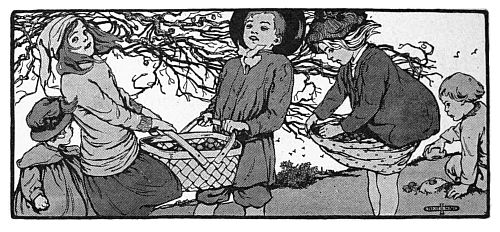
The children are gathering nuts.
They are gathering nuts for the winter.
The dead leaves are flying from the trees.
But the nuts still hang on the trees.
The children say, “Winter is coming.
It will soon be here.
The birds are flying away.
They are going far away.
They are going where there is no winter.
But we children love winter time.”
Good-by, little birdies.
Fly through the sky,
Singing and singing
A merry good-by.
Tell all the birdies
Flying above,
We in our garden
Send them our love.
We’d like to go with you
If we could fly.
It must be so beautiful
Up in the sky.
| sky | fly | try | spy |
| skies | flies | tries | spies |
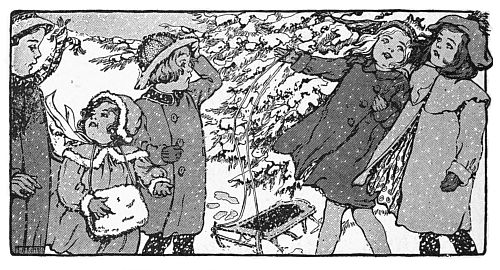
It is a snowy winter day.
The children are having fun in the snow.
They are catching the big white flakes.
The flakes look like tiny white feathers.
They fall thicker and thicker.
Frank says, “I don’t like a rainy day.
But I do like a snowy day like this.”
| snow | wind | air | rain |
| snowy | windy | airy | rainy |
The short winter days are full of fun.
The children like to be out in the snow.
They have fine rides down the sides of the hills and on the pond.
Father takes them for sleigh rides, too.
They have fun in the long winter nights.
They roast apples and toast nuts.
They sing, “Roast, Apples, roast! Toast, Nuts, toast!”
They tell stories and answer riddles.
They play games and sing songs.
The children say that winter is pleasanter than spring or summer or fall.
They say that winter nights are pleasantest of all.
| toast | roast | coast | boast |
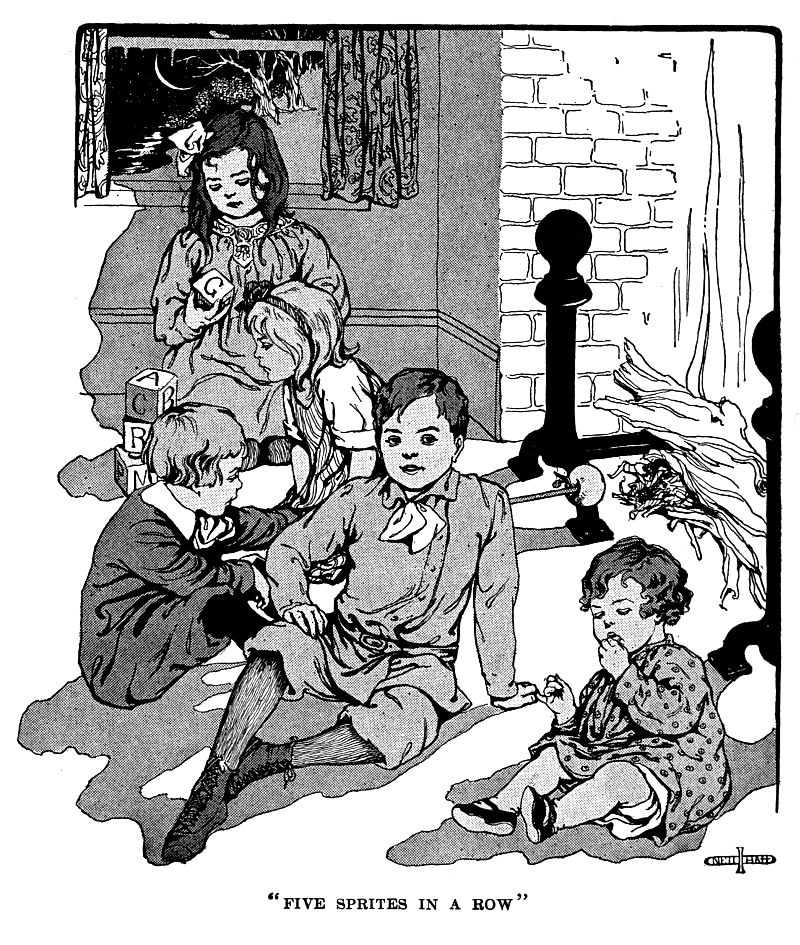
| 1. | Her silvery bow, | bow |
| The new moon hangs low. | low | |
| Above the white snow, | snow | |
| Stars glitter and glow. | glow | |
| 2. | The dark waters flow | flow |
| So silent and slow. | slow | |
| The winter winds blow | blow | |
| And icicles grow. | grow | |
| 3. | The flames blaze and glow | glow |
| And queer shadows throw, | throw | |
| Then rising, they show | show | |
| Five sprites in a row. | row |
—M. S. Willis.

Did you see the children by the fire?
They were playing a game that they sometimes play at school.
The game is called “Matching Rimes.”
This is the way they play the game.
Some one says, “Match my rime.”
Then he gives a short saying.
Every one must try to be the first to give another short saying.
It must match, or rime, with the first short saying.
The short saying must be one that everybody knows.
All who cannot give a short saying must give words.
The words must match, or rime, with the last word of the short saying.
This is how the children played the game of Matching Rimes.
| Frank: | As green as grass. | |||
| Grace: | As smooth as glass. | |||
| The others: | grass | mass | pass | class |
| glass | bass | lass | brass | |
| Alice: | As bright as a star. | |||
| Max: | As black as tar. | |||
| The others: | star | bar | far | par |
| tar | jar | car | spar | |
| Grace: | As still as mice. | |||
| Frank: | As cold as ice. | |||
| The others: | ice | nice | price | dice |
| mice | rice | vice | slice | |
On a winter night Betty likes to hear the story of the teeny-tiny lady.
Once there was a teeny-tiny lady.
She lived in a teeny-tiny house.
One winter night the teeny-tiny lady had been asleep a teeny-tiny while.
All at once she heard a teeny-tiny noise, “Tap, tap, tap! Tap, tap, tap!”
At first she hid her teeny-tiny head.
But she heard the teeny-tiny noise again, “Tap, tap, tap! Tap, tap, tap!”
She jumped out of her teeny-tiny bed.
She took the teeny-tiny candle in her teeny-tiny hand.
Then she stole down the teeny-tiny stair.
She looked under her teeny-tiny table.
There was nothing under the table.
She looked under her teeny-tiny chair.
There was nothing under the chair.
She went back up her teeny-tiny stair with her teeny-tiny candle.
She got into her teeny-tiny bed.
Soon the teeny-tiny lady heard the teeny-tiny noise again.
She took her teeny-tiny candle.
She stole down her teeny-tiny stair.
She looked under her teeny-tiny table.
Out jumped a teeny-tiny ....!
“A mouse! A mouse! A mouse!” cried the teeny-tiny lady.
And up her teeny-tiny stair she ran.
| chair | stair | fair |
| hair | pair | air |
Once there was a boy named Billy.
Every one called him Billy Boy.
Billy was a poor little lad.
He had never had a home.
One day Billy said, “I’m going out into the world to find my fortune.”
As Billy was passing a barn he saw a poor old donkey.
His head was hanging down as he cried, “Wee-haw! Wee-haw!”
“What’s the matter, old Wee-haw?
Why hang your head?” said Billy.
“I’ll tell you what’s the matter,” said the poor old donkey.
“My master gives me nothing to eat but old wheat straw.
He says I am too old to work.”
“Come with me, old Wee-haw,” said Billy.
“You may help me work for my fortune.
You shall have sweet hay, not old straw.”
So on went Billy Boy and his friend, the donkey, to find a fortune.
In a little while they met a poor dog.
His head was hanging down as he cried, “Bow-wow! Bow-wow!”
“What’s the matter, old Bow-wow?
Why do you hang your head?” said Billy.
“My master says I’m too old to watch and bark at night.
So he never gives me meat to eat,” said the poor old dog.
“Come with me, old Bow-wow,” said Billy.
“Help watch for my fortune and you shall eat meat every day.”
On went Billy and his friends, the donkey and the dog, to find the fortune.
After a while they saw a poor cat.
Her head was hanging down as she cried, “Mee-ow! Mee-ow! Mee-ow!”
“What’s the matter, old Mee-ow mee-ow?
Why do you hang your head?” said Billy.
“My master knows that my teeth are old.
Yet he gives me nothing to eat,” said the poor old cat.
“While my teeth are not sharp now, my claws are as sharp as ever.
Still it takes a long time to catch mice.
I should have meat to eat.”
| saw | raw | straw | claw |
| paw | draw | jaw | squaw |
“Come with me, old Mee-ow mee-ow,” said Billy.
“You may help catch my fortune.
Then your claws and paws will do all that you want them to do.”
So on went Billy Boy and his friends.
After a while they saw a fat rooster.
He was sitting high up in a tree-top.
“Cock-a-doodle-doo!” said the rooster.
“What’s the matter, old Cock-a-doodle?
Why are you singing in the tree-top at this time of day?” said Billy.
“My master says I’m to go into the pot.
I’m to boil, boil, boil, then roast and toast till I’m done,” said the rooster.
| boil | toil | soil | spoil |
“Come with me, old Cock-a-doodle.
You may help me sing for my fortune.
Then no one shall boil you,” said Billy.
So on went Billy Boy, the donkey, the dog, the cat, and the rooster.
By and by, as they were passing through a great dark forest Billy said,
“Let us rest here, my friends.
To-morrow we will march into the forest.”
The rooster flew into a tree top,
“I see a light, friends,” he said.
“Is it the light of the moon?” said Billy.
“No,” said the rooster, “it is not.”
“If it is not the moon, let us go and see what it is,” said Billy.
So they went on through the forest.
Then they saw the light in a little house.
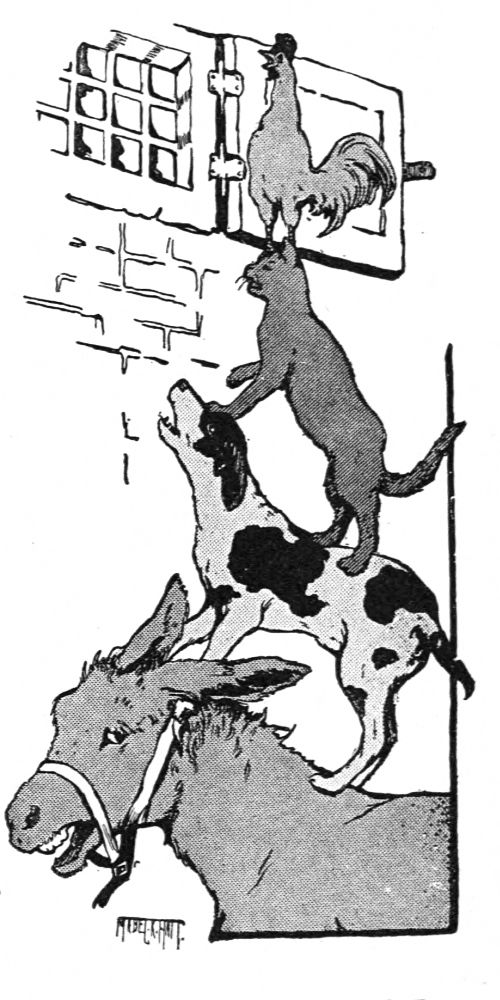
The light came through the window.
The window was high above the ground.
“I can’t see into the house,” said Billy.
“I’ll make a ladder.
Come here, Bow-wow.
You jump on Wee-haw’s back.
Come, Mee-ow mee-ow.
You bounce up on Bow-wow’s back.
Come, Cock-a-doodle.
You fly up on
Mee-ow mee-ow’s back.
Tell me what you see, Cock-a-doodle.”
Cock-a-doodle said, “I see some men sitting around a table.
They have gold in a heap on the table.”
“The men in the house are robbers,” said Billy Boy.
“I think we can drive the robbers away.
When I say, ‘One, two, three,’ make all the noise you can.
One, two, three!” said Billy.
“Wee-haw! Wee-haw!” said the donkey.
“Bow-wow! Bow-wow!” said the dog.
“Mee-ow! Mee-ow!” said the cat.
“Cock-a-doodle-doo!” said the rooster.
Such a noise you never heard.
The frightened robbers jumped and ran to the forest with all their might.
Then the friends went into the house.
| jump | watch | march | bark |
| jumped | watched | marched | barked |
Billy found a bed and went to sleep.
The cat jumped into a chair by the fire.
The dog lay down under the table.
The donkey lay down in some straw before the barn door.
The rooster flew to the top of a high tree.
By and by, one of the robbers came back.
He stole in by the back door.
In the dark, he ran over the cat’s chair.
The cat jumped up in a rage and gave him a scratch in the eyes.
The dog jumped up and bit him.
As he ran by the barn, the donkey gave him a kick. Down he went.
“Cock-a-doodle-doo!” cried the rooster.
| her | hers | herd | herds |
The frightened robber jumped up and ran with all his might.
He told the other robbers that he would never go back to that house.
“There’s an old woman there who tried to scratch my eyes out,” he said.
“There’s a man there with a sharp knife.
He cut me with his knife as I ran.
A man at the barn had a big stick.
He gave me a knock, and down I went.
As I got up to run, a little man cried,
‘I’ll knock the noodle, too!’ ”
So the robbers never went back.
But Billy Boy and his friends lived there
safely for a long, long time.
| rage | cage | page | sage |
Robin Redbreast was hopping about in the woods at Yule time.
The Yule time is Christmas time.
In the woods, Robin Redbreast saw an old, gray, greedy Pussy-Cat,
The cat said, “Pray, where are you going, Wee Robin?”
Robin said, “I’m going to see the king.
I’ll sing a song to God and the king this good Yule morning.”
Pussy said, “Come here, Wee Robin.
I’ll show you a bonny white ring around my neck.”
But Robin Redbreast said, “No, no, gray, greedy Pussy.
I saw you catch the wee mouse, but you shall not catch me.”
So Robin flew away and away.
By and by he came to a wall.
There he saw a gray, greedy hawk.
The hawk said, “Pray, where are you going, Wee Robin?”
Robin said, “I’m going to see the king.
I’ll sing a song to God and the king this good Yule morning.”
The hawk said, “Come here, Wee Robin.
I’ll show you a bonny white feather in my wing.”
But Robin Redbreast said, “No, no, gray, greedy Hawk.
I saw you catch the wee mouse, but you shall not catch me.”
So Robin flew away, and by and by he came to a great heap of rock.
By the great heap of rock, Robin saw a gray, greedy fox.
The fox said, “Pray, where are you going, Wee Robin?”
Robin said, “I’m going to see the king.
I’ll sing a song to God and the king this good Yule morning.”
The fox said, “Come here, Wee Robin.
I’ll show you a bonny white spot on the tip of my tail.”
Robin said, “No, no, gray, greedy Fox.
I saw you catch the wee lamb, but you shall not catch me.”
So Robin Redbreast flew away and away.
He came safely to the king’s house.
He shook his feathers and his wings and sat in the king’s window.
Then Robin sang a sweet song to God and a merry song to the king.
The king said, “What shall we give Robin for singing such a merry song this good Yule morning?”
And the queen said, “Let us give him the wee Jenny Wren to be his bride.”
So Robin Redbreast flew away and away to find the wee Jenny Wren.
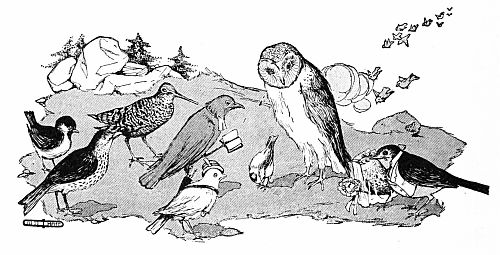
| yule | mule | pule | gule |
Robin Redbreast went flying away through the wood.
There he saw his friend the sparrow with his bow and arrow.
He told the sparrow about his bride, the wee Jenny Wren.
The sparrow said, “I will fly away and tell all the birds about the wedding.”
So the sparrow took his bow and arrow.
He told all the birds about the wedding of Robin and Jenny Wren.
So all the birds came to sing at the wedding of Robin Redbreast.
The chickadee came with the little birds.
The owl came with the big birds.
The cuckoo came with the others to sing for Robin and Jenny Wren.
Now, no one liked the cuckoo, because he was never kind to other birds.
He fell into a rage with Jenny, the bride.
He began to pick out her feathers and pull her pretty wings.
Robin Redbreast was trembling with rage at the cuckoo.
His friend, the sparrow, was angry, too.
So the sparrow let fly his arrow at the cuckoo.
But the arrow struck poor, poor Robin Redbreast and killed him.
The birds fell to sighing and sobbing for poor, dead Robin.
Great was the sobbing of Jenny Wren.
But no sighing and sobbing was as great as the sparrow’s.
Who killed Cock Robin?
“I,” said the sparrow,
“With my bow and arrow.
I killed Cock Robin.”
Who saw him die?
“I,” said the fly,
“With my little eye.
I saw him die.”
Who’ll dig his grave?
“I,” said the owl,
“With my spade and show’l
I’ll dig his grave.”
Who’ll toll the bell?
“I,” said the bull,
“Because I can pull.
I’ll toll the bell.”
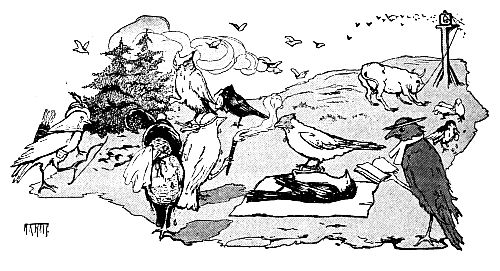
All the birds of the air
Fell to sighing and sobbing,
When they heard the bell toll
For poor Cock Robin.
| pull | toll | roll |
| full | poll | troll |
| bull | boll | stroll |
It is the night before Christmas.
The wind whistles and howls out of doors.
The flakes of snow fall thicker and thicker.
The snow grows deeper and deeper.
Frank heaps on more wood and the fire roars up the chimney-flue.
Father is making shadow pictures on the wall for Betty.
Mother is knitting stockings.
Do you see Grace and Alice working on the Christmas tree?
Max is peeping up the chimney-flue.
He says, “Mr. Santa Claus, we will hang up our stockings, to-night.”
Mother says, “Look at the clock, children.
It’s time to hang up your stockings.
Then we will sing our Christmas songs.”
Little fairy snowflakes
Dancing in the flue;
Old Mr. Santa Clans,
What is keeping you?
Twilight and firelight
Shadows come and go;
Merry chimes of sleigh bells
Tinkle through the snow.
Mother’s knitting stockings.
Pussy’s got the ball.
Don’t you think that winter’s
Pleasanter than all?
—Thomas Bailey Aldrich.
| sleigh | neigh | weigh |
| sleighs | neighs | weighs |
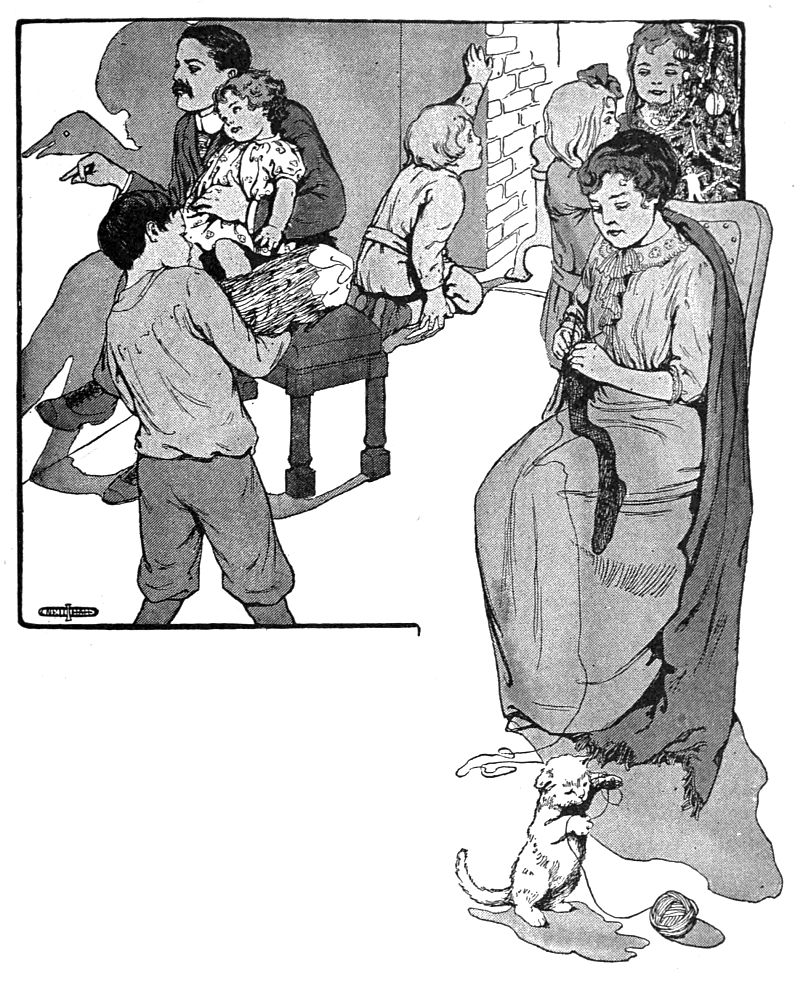
Heap on more wood,
The wind is chill.
But let it whistle
As it will,
We’ll keep our Christmas
Merry still.
—Walter Scott.
The children have been happy all winter.
Winter has seemed very short to them.
While it was still winter they said,
“Winter is pleasanter than all.”
But now they say that the trees and the flowers seem to be dead.
Betty says, “Has Jack Frost killed them?”
“No, no, the flowers do not die,” says Mother.
“Jack Frost has only put them to sleep.
They will wake and bloom again when the spring comes.”
Then the children say, “We shall be glad when spring comes again.”
| bloom | kill | seem | snow |
| bloomed | killed | seemed | snowed |
The flower is asleep,
But it is not dead.
When the morning shines,
It will lift up its head.
When the winter comes,
It will die! No, no!
It will only hide
From the frost and snow.
Sure is the summer.
Sure is the sun.
The night and the winter,
Away they run.
—George Macdonald.
| dead | head | bread | lead |
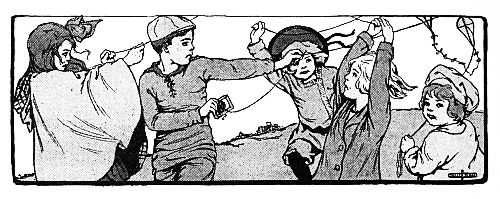
The children are flying kites.
They pitch the kites into the air.
The kites are afloat in the air.
See how the wind lifts the kites and tosses them about.
Betty cries, “Blow, wind, blow! Catch my kite!
Lift it and make it dance!”
Kite flying is fun for the spring time.
| toss | catch | pitch | dance |
| tosses | catches | pitches | dances |
Here is an old story that the children like to read.
It is the story of the Wind and the Sun.
Once the Wind said to the Sun,
“You are not so strong as I am.
See how the great trees bow before me.
See how the leaves are trembling.
The trembling leaves know that I broke the tree you see on the ground.
You can not make great trees fall to the ground.
You can not do this because you are not so strong as I am.”
The Sun said, “I can make the trees and flowers grow.
You are not so strong as I am, for you can not make a tree grow.”
Just then a man came over the hill.
The Sun said, “Let us see who can make that man take off his coat.”
“Let me try first,” said the Wind.
So he blew and blew and blew and blew.
“Whew! How cold that wind is!” said the man, holding his coat.
The Wind blew again, but the man would not take off his coat.
Then the Sun said, “Now I will try.”
So the Sun began to shine down on the man with all his might.
“Whew!” said the man. “How hot it is!”
And then the man took off his coat.
| blew | dew | pew | few |
| flew | new | mew | whew |

Who has seen the wind?
Neither I nor you,
But when the leaves hang trembling,
The wind is passing through.
Who has seen the wind?
Neither you nor I,
But when the trees bow down their heads,
The wind is passing by.
—Christina Rossetti.
| hang | sang | rang | sprang |
| bang | clang | fang | gang |
There is a story that Mother tells in the happy spring time.
She tells it when the flowers and trees are waking from their winter sleep.
It is the story of Briar Rose.
There was once a good king and queen who had no children.
Every day the queen would say,
“I wish we had a little daughter.”
One day the queen sat by a stream.
She heard a noise, “Splash! Splash!”
A frog came out of the water and said,
“Your wish shall come true.
Before the year has gone by, you shall have a little daughter.”
And before the year was over, the queen had a little daughter.
The king said, “We must have a feast for all the wise men and women.”
Now there were six wise women in the kingdom.
There was another wise woman who had been away for a long time.
She had just come back to the kingdom.
The king had forgotten all about her.
So he had only six gold plates made.
These plates were for the wise women.
The feast day came at last, and everybody seemed very happy.
The six wise women came to make their gifts to the king’s daughter.
| six | ox | Max | box |
| fix | fox | ax | Nox |
The first wise woman said, “This is my gift to the princess.
She shall be very sweet and good.”
Then one by one the wise women said,
“The princess shall be very wise.”
“The princess shall be very strong.”
“The princess shall be very beautiful.”
“Every one shall love the princess.”
The last wise woman was about to say,
“The princess shall live a long time.”
Just then, in came another wise woman.
She was the one the king had forgotten.
No gold plate had been set for her.
This angry wise woman was trembling all over with rage.
She said, “What! No gold dish for me?
Then you shall hear what my gift is.”
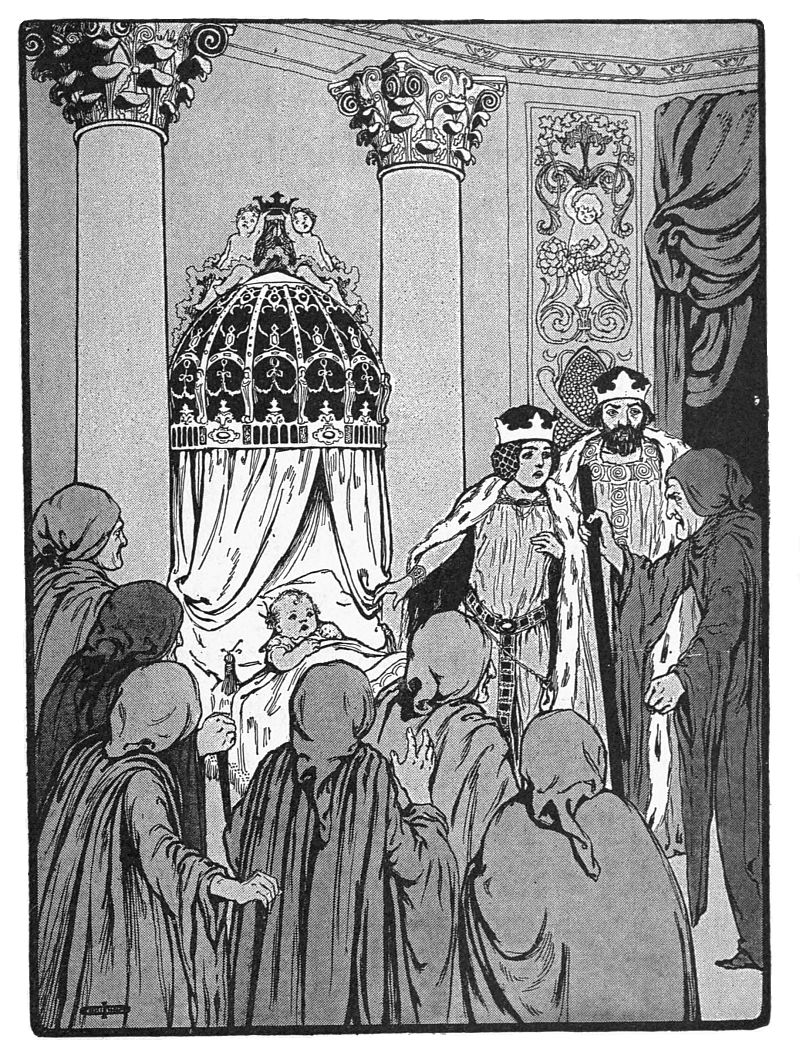
This was the angry wise woman’s gift:
“The princess shall stick a spindle into her hand when she is sixteen.
Then she shall fall down dead.”
With that, the angry woman went away.
But one of the wise women had not made her gift to the princess.
So she said, “Now, I will make my gift.
I can’t do away with all the bad gift of the angry wise woman.
But the princess shall not die when she is sixteen years old.
She must stick a spindle into her hand.
But she will only fall into a deep sleep.
She will sleep for a hundred years.
Then a brave and strong prince shall come and wake her.”
Then the king said, “Burn the spindles.
Burn every spindle in the kingdom.
Let there be no spinning in the kingdom.”
So no more spinning was done in that kingdom.
The princess lived in the great castle until she was sixteen years old.
One day she came to a dark, narrow stair.
Everybody had forgotten about the stair.
The princess went up the narrow stair that had been so long forgotten.
At the top she came to a little room.
There was an old woman there spinning.
She made the spindle turn and whirl round and round.
| burn | turn | churn | urn |
“Good-day, Mother,” said the princess.
“Please tell me what you are doing.”
“I am spinning,” said the old woman.
“How do you turn this funny thing that goes whirl, whirl, whirl?”
As the princess said this, she tried to turn the sharp spindle.
The spindle struck her hand and she fell upon a bed that stood by.
In one second, the princess and all in the castle had fallen asleep.
The horses in the stable and the dogs on the lawn fell asleep.
No sound was heard. The birds, the trees and the flowers had fallen asleep.
| girl | twirl | whirl | whirls |
A great hedge of briars grew up all around the castle and hid it.
Every year the great hedge of briars grew thicker and thicker.
The story of the sleeping princess was told in other kingdoms far away.
Sometimes they called her Briar Rose.
More than one brave prince tried to find the sleeping castle.
But no one could get through the hedge.
Long years went by. The sleeping princess seemed forgotten by every one.
Only the oldest men ever told the story.
For a hundred years the princess lay sleeping in the old castle.
| hedge | wedge | sedge | pledge |
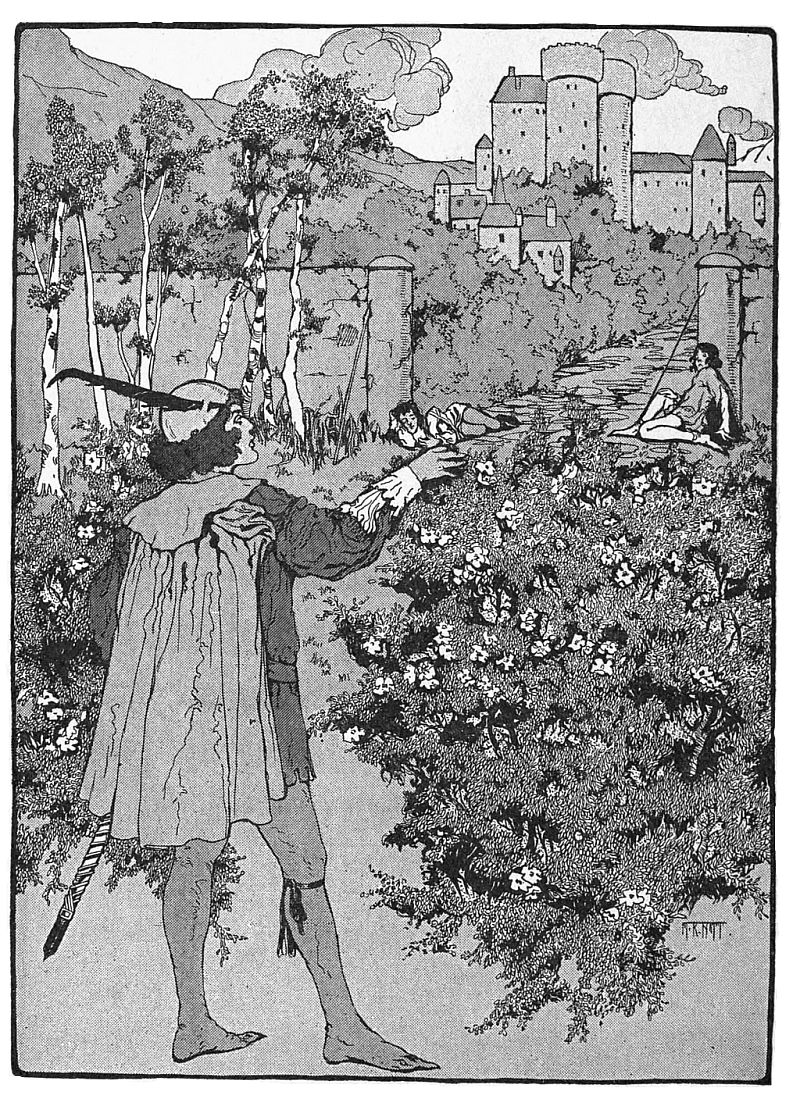
At last a brave prince, far away, heard of the sleeping castle.
He came to find Briar Rose.
The oldest men told him that no one could get through the briar hedge.
But the prince would not turn back.
He broke the briars with his hands.
Then snowy flowers bloomed where the briars had been.
And the prince came safe to the castle.
He found everything fast asleep.
No wind was blowing. No sound was heard in all the castle.
At last the prince came to the foot of the narrow stair.
In a room at the top of the stair he found Briar Rose fast asleep.
Briar Rose was as sweet and rosy as when she first fell asleep.
The prince said, “Wake, dear princess.”
She opened her eyes and smiled.
“I’ve been waiting for you,” she said.
Then all the world began to wake.
The king and the queen opened their eyes.
The birds began to sing. The wind began to blow through the trees.
The sweet flowers began to bloom.
“Come, Briar Rose,” said the prince.
And they went down the dark stair out into the beautiful world.
“Of all the stories, we like Briar Rose the best,” said the children.
| narrow | arrow | sparrow |
To house and garden, field and lawn,
The meadow gate we swang upon,
To pump and stable, tree and swing,
Good-by, good-by to everything.
And fare you well for ever more,
O ladder at the hayloft door!
O hayloft where the cobwebs cling!
Good-by, good-by to everything.
—Robert Louis Stevenson.
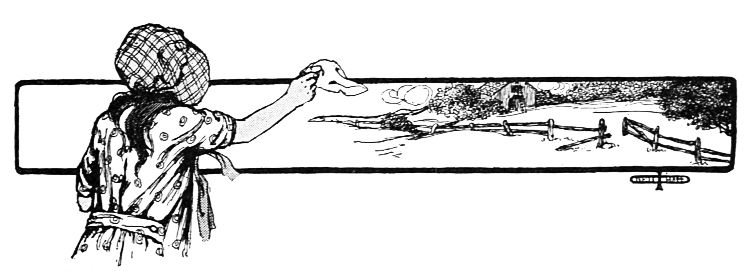
The following list gives all the new words that are to be drilled upon as wholes in the order, by pages, in which they appear. Those pages containing no such new words are here omitted.
| 1. | their | 29. | could | 62. | world | 94. | lady |
| Betty | Drumikin | might | teeny-tiny | ||||
| girls | fallen | stair | |||||
| fire | 63. | dame | table | ||||
| 2. | oak | Tum-tum | master | ||||
| hope | fast | fiddling | 96. | Billy | |||
| dear | she’ll | fortune | |||||
| 30. | nothing | Cock-a-doodle | donkey | ||||
| 3. | birdie | growled | while | Wee-haw | |||
| rose | matter | ||||||
| tree-top | 33. | stable | 64. | rainbow | |||
| for | place | clouds | 97. | friend | |||
| hayloft | bridge | ||||||
| 5. | happy | ladder | 98. | claw | |||
| three | from | 65. | daughter | ||||
| years | Iris | 99. | boil | ||||
| 34. | garden | above | |||||
| 6. | bough | rosebuds | mountains | 101. | heap | ||
| just | yellow | colors | |||||
| wind | daffodils | 102. | robbers | ||||
| rock-a-by | gathering | 66. | lift | ||||
| safe | foot | 103. | rage | ||||
| 35. | pray | shouldn’t | |||||
| 7. | blue | true | 104. | knife | |||
| safely | body | 67. | riddle | noodle | |||
| rest | moon | ||||||
| 36. | Daffydowndilly | 105. | Robin | ||||
| 8. | vine | bonnet | 68. | rosy | Redbreast | ||
| hung | gown | more | Yule | ||||
| sung | light | Christmas | |||||
| something | 37. | eyes | gray | ||||
| eat | shoe | 69. | twinkle | ||||
| gone | lost | wonder | 106. | hawk | |||
| great | |||||||
| 10. | such | 38. | queen | dew | 108. | Jenny | |
| found | diamonds | bride | |||||
| larks | been | 70. | bonny | ||||
| gave | boat | 109. | sparrow | ||||
| 11. | air | silver | arrow | ||||
| round | 40. | rain | a-float | bow | |||
| grass | want | sea | wedding | ||||
| deep | Spain | cuckoo | |||||
| 71. | golden | ||||||
| 12. | neck | 41. | every | leaves | 110. | because | |
| put | who | angry | |||||
| would | 72. | stay | killed | ||||
| 13. | once | Mary | sighing | ||||
| ’tis | 42. | our | heard | sobbing | |||
| God | read | ||||||
| book | 73. | chopping | 111. | die | |||
| 14. | summer | Goose | stood | grave | |||
| green | picture | fairy | spade | ||||
| mow | work | show’l | |||||
| help | 43. | beggars | toll | ||||
| velvet | 74. | deeper | bull | ||||
| 15. | sang | hark | |||||
| if | bark | 75. | honest | 113. | chimney-flue | ||
| I’m | rags | or | shadow | ||||
| tags | neither | knitting | |||||
| 16. | beautiful | stocking | |||||
| stars | 44. | horn | 77. | castle | Santa | ||
| bright | wake | near | Claus | ||||
| asleep | haystack | hundred | |||||
| chair | grew | 115. | twilight | ||||
| 19. | field | before | chimes | ||||
| mice | 45. | blow | nor | ||||
| story | 116. | seem | |||||
| stories | 46. | Pussy | 78. | door | seemed | ||
| answer | kingdom | frost | |||||
| 20. | soon | frightened | brother | ||||
| lived | London | forest | 118. | kites | |||
| wheat | youngest | ||||||
| corn | 47. | buy | noise | 119. | bow | ||
| kittens | trembling | ||||||
| 21. | stole | mittens | 79. | oldest | |||
| oranges | straw | far | 120. | coat | |||
| meat | paw | yourself | off | ||||
| cried | waiting | holding | |||||
| shall | 48. | ever | whew | ||||
| we’ve | 80. | passing | |||||
| 22. | seen | second | 122. | Briar | |||
| should | 49. | first | |||||
| growl | pie | 81. | stream | 123. | feast | ||
| room | women | ||||||
| broom | 50. | fear | 82. | walnut | wise | ||
| mee-ow | moss | six | |||||
| 23. | grow | began | gifts | ||||
| sure | 83. | tried | forgotten | ||||
| 51. | purr-r | plates | |||||
| 24. | Lambikin | 84. | word | ||||
| side | 52. | gingerbread | dropped | 124. | princess | ||
| granny | woman | ||||||
| along | kettle | 85. | axes | 126. | spindle | ||
| fox | whose | splash | sixteen | ||||
| I’ll | brave | ||||||
| 53. | wish | 86. | dead | prince | |||
| 25. | Grannikin | love | hang | can’t | |||
| he’ll | done | winter | |||||
| wolf | dish | 127. | burn | ||||
| howl | take | 87. | merry | spinning | |||
| we’d | turn | ||||||
| 26. | lion | 54. | never | narrow | |||
| roar | 88. | feathers | whirl | ||||
| roared | 56. | dark | flakes | ||||
| like | poor | thicker | 128. | sound | |||
| lawn | |||||||
| 27. | last | 57. | half | 89. | sleigh | ||
| kind | roast | 129. | hedge | ||||
| 59. | rainy | toast | lay | ||||
| 28. | called | rail | pleasanter | ||||
| to-morrow | build | short | 132. | opened | |||
| I’ve | leak | smiled | |||||
| roll | morning | 92. | only | best | |||
| skin | awake | ||||||
| 60. | sharp | 93. | glass | ||||
| teeth | tar | 133. | swang | ||||
| ice | pump | ||||||
| 61. | plaster | gate | |||||
| carry | fare | ||||||
| rooster | cobwebs |
The following words occurring in the text of this book were given in the phonic drills of the Primer. For this reason, as well as on account of their extreme simplicity, they will require no special drill. The child will recognize them at a glance. This list, together with the preceding Vocabulary, includes all the new words in the First Reader.
| fat | fall | fine | cluck |
| sat | wall | shine | till |
| bad | got | bit | chill |
| had | not | fit | still |
| bag | top | dig | think |
| rag | drop | fig | fun |
| tag | long | hid | sun |
| man | strong | did | cut |
| Dan | pet | tip | nut |
| Fan | met | trip | cry |
| pan | set | king | sky |
| than | wet | ring | why |
| hand | fret | wing | told |
| sand | men | cling | gold |
| match | wren | spring | cold |
| scratch | send | pick | wee |
| tall | bend | slick | thee |
In the First Reader there are several phonic jingles of the kind found in the Primer. These are to be read by the teacher and sung by the pupils. These jingles and the lists of words which close many of the lessons furnish most appropriate material for phonic drill. In every instance one or more of the words given in these lists has been previously used in sentences and has been made familiar to the pupils as a whole word. Such words are used as keywords for analyzing the other words of the lists into their component parts. It is not at all necessary, however, that the pupil should know the meaning of all the words given for purely mechanical drill.
The teacher may wish, on occasion, to review some sound or to teach some needed new sounds. If at all possible, this should always be done when no list of words for phonic drill is provided with the reading lesson. At the close of the book, several lists of drill words are given which may be used whenever the teacher finds it convenient to do so. It is understood that the teacher will expand these lists, as well as those at the end of the reading lessons, by adding, as they are developed from day to day in the regular class work, other words containing the same sound and symbol. For instance, at the end of the reading lesson on page 117, the words, head, dead, lead, and bread will be found. When the teacher shows these words to the pupil, she should try to elicit such words as read, dread, tread, thread, spread, etc., which she will then write on the blackboard. If the children cannot think of such additional words, the teacher, herself, should give them. Thus the method suggested becomes extremely helpful and flexible.
Practically all the words of the Primer are repeated in the First Reader—something not true of many First Readers. About 400 new words are introduced. The vocabulary listed on pages 134, 135, and 136 includes only the words upon which the pupils should be drilled as whole words. But there are other words, simple and analogous in form, which require no special drill, and these should not be, and are not, listed with the words that do need such drill.
To illustrate: the words man, Fan, and Dan occur on page 52 as new words in the text. They require no drill; yet, because this is the first time they have appeared in the text, they should be listed somewhere in this book. Such words are to be found on page 137, with other words which the pupils can master at a glance. These lists of analogous words furnish opportunity for the pupils to test their own ability to master words at sight.
Much has been said and written regarding the time and energy that is wasted in drilling pupils upon words that they should be able, and are able, to pronounce at sight. Yet in many First Reader vocabularies we find such words listed with those that require drill. Such an illogical and unpedagogical arrangement has been avoided in this book by the classification mentioned above.
In spite of this precaution, however, the teacher will find in the drill vocabulary, on pages 134, 135, and 136, some words which the pupils can pronounce at sight, and this they should be encouraged to do. Nevertheless, all such words should be taught first as wholes, after which they may be used, if desired, as keywords in making new lists for phonic drill.
Up to this point, we have considered only the mechanics of reading. But there is another side of reading of even greater importance; namely, the bringing of the child into that receptive and sympathetic mood without which no real reading can be accomplished. Even where the lesson consists of only a few lines, the teacher, by showing the lesson picture and conversing with the children about it, or by discussing with them the underlying thought of the text, will have no difficulty in arousing the necessary interest.
Many of the lessons in this book lend themselves to simple, but none the less vivid, dramatization. Some of those that are most suitable for dramatic action are indicated in the text. It is hoped that these examples will suggest to the pupils how other lessons may be dramatized without any special preparation, in the sense of rehearsing, and without any special paraphernalia whatever except the articles usually found in the ordinary schoolroom. The pupils should be given frequent opportunities to plan by themselves for such dramatization, precisely as done by the children in the book itself. They should be led gradually to create dialogue and action for themselves, the teacher withdrawing herself more and more into the background.
The children who appear in this First Reader are the same children who made the Primer a connected story. But the interest in them, as they appear in this later book, is in no wise dependent upon a knowledge of the Primer. The experiences and adventures of these five children, binding as they do, the lessons together, give an admirable unity and sequence to the whole.
| lamp | leg | ten | tent |
| damp | beg | den | bent |
| camp | keg | fen | sent |
| stamp | peg | glen | went |
| nut | gun | hump | limp |
| rut | nun | pump | crimp |
| hut | pun | lump | shrimp |
| shut | shun | clump | imp |
| sell | dull | hill | kept |
| shell | gull | hilly | slept |
| smell | cull | sill | wept |
| spell | mull | silly | swept |
| neck | brick | clock | cluck |
| necks | bricks | clocks | clucks |
| speck | trick | block | duck |
| specks | tricks | blocks | ducks |
| left | help | lift | drift |
| theft | yelp | gift | shift |
| muff | doff | staff | miss |
| stuff | off | quaff | kiss |
| dress | bless | cress | fuss |
| dresses | blesses | cresses | fusses |
| spade | shape | cave | late |
| grade | grape | wave | gate |
| shade | drape | brave | rate |
| wade | scrape | grave | mate |
| pale | wake | blaze | vase |
| tale | shake | blazes | vases |
| vale | sake | gaze | case |
| dale | flake | gazes | cases |
| more | note | cone | spoke |
| wore | wrote | bone | broke |
| fore | dote | tone | choke |
| snore | quote | lone | stroke |
| soon | gloom | goose | poor |
| moon | gloomy | loose | boor |
| spoon | room | moose | moor |
| coon | roomy | noose | moors |
| road | oak | plain | paint |
| toad | soak | drain | saint |
| load | cloak | gain | faint |
| goad | croak | grain | quaint |
| laid | sharp | hard | part |
| maid | harp | yard | cart |
| paid | carp | card | dart |
| lawn | grief | piece | dye |
| dawn | chief | niece | lye |
| fawn | thief | nieces | rye |
| while | kite | fire | five |
| mile | site | wire | live |
| smile | spite | tire | dive |
| pile | sprite | spire | hive |
| seal | leak | feast | bean |
| deal | weak | least | mean |
| steal | peak | beast | clean |
| peal | speak | yeast | glean |
| deer | need | feet | deem |
| queer | seed | meet | seem |
| seer | steed | sweet | seemed |
| side | fore | long | hind |
| beside | before | belong | behind |
| shout | right | wrong | story |
| shouting | righted | wronged | stories |
| sprout | light | prong | lady |
| sprouting | lighted | pronged | ladies |
| care | let | but | bit |
| fare | letter | butter | bitter |
| bare | bet | cut | lit |
| stare | better | cutter | litter |
| battle | kettle | tinkle | whistle |
| rattle | settle | twinkle | thistle |
| willow | broken | often | listen |
| pillow | spoken | soften | glisten |
[The end of The Haliburton First Reader by Margaret Winifred Haliburton]